#w/ programming or possible work futures relating in any way to it
Explore tagged Tumblr posts
Text
I literally decided to learn like the very basics of python today which apparently awoke my brain so now it wants to do EVERY.SINGLE.THING i haven't done these past last //waves incoherently-time....at once
this is good on one hand because yay motivation really bad on the other because if I don't tread carefully i will loose motivation for all those things because idk choice paralysis or whatever it's called
too many things, too little time
#txts#we got#general just get into programming and see if ANYTHING there is fun and could be useful-but in a job way#also learn some things for game dev stuff#also make a game#not a big complicated one#but i do wanna go back into my old lil rpg maker style idea just to have something-anything#so also make art and flesh out ocs#and story and puzzles etc#i am combining game+coding+learning unreal basically in parts#why unreal for a top down rpg 2d game?#because i have ambitions beyond the realm of 2d and wanna familiarize myself with it#instead of having to still learn from scratch#i KNOW rpg makers vx and ace well enough#but they arent gonna help me transfer anything to unreal#thats entirely different worlds#so...................yeAH#w/ programming or possible work futures relating in any way to it#i decided on a 'fuck it we ball' approach of A:just learn it first#B: make some general things with it either basics apps or design a web page etc etc#to then C: see what you actually liked the most from each bit to decide where you can dip your toes in#IF it all works out#look my coworker who also trained me and whom i adore and trust with...well everything#decided i am smart enough for more than retail#so we are gonna do this#idc how long it takes#less because my brain is a fart and more because i will not be able to find the time between working 10hour shifts#BUT THATS OKAY#....i hope.....look i am really holding onto ye wise 30 to 40 year olds who say it gets better#do not disappoint me
0 notes
Note
Now that you've had some time to cool down from the Fuckfest of Friday Night, I'm a little curious on what you think of MonoTV's whole deal, because I haven't seen anyone actually talk about it much and that makes me so upset because wow Dev somehow managed to get me to care about this piece of steel
Spoilers up to the end of CH2
Hey! Yeah, MonoTV, huh? With everything else going on, this thing kinda got pushed aside, but there's been some really interesting developments indeed. I agree though, it's genuinely pretty incredible dev managed to get me to care about what up to this point had been nothing but a device for plot and humor.
You know, I originally wanted to keep this brief to give my full thoughts on the full part 2 analysis I'm working on, but maybe it's better if I just talk about it in full here and just link to this post from that one. Let me start by the theory side, because that's easier for me to write about :v
While MonoTV's creation being connected to XF-Ture Tech was always a very real possibility, the confirmation that at least its personality drivers come from them is nice. And there doesn't seem to be any type of repurposing going on:

MonoTV: Whenever I make a decision, ultimately, I must make the choice that fulfills my purpose [to run the killing game until the death of every participant]. After all, that was why I was created.
While we don't fully understand how this all fits together yet, I'm glad XF is being brought up because that might mean Min content in the future? For me, please? :,D
Anyways. Having a clearly stated goal for the killing game (killing all the participants) is also pretty useful for theory-crafting purposes, so look forward to seeing that line referenced in mastermind discussions moving forward. Not to mention, the secondary purpose of MonoTV playing the villain, with the reasoning:
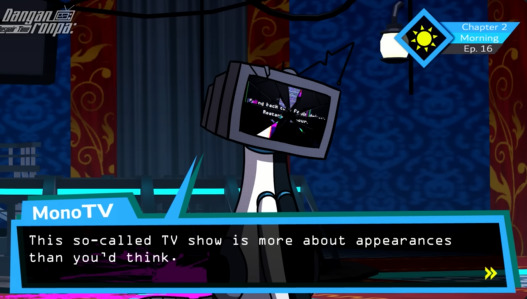
MonoTV: This so-called TV show is more about appearances than you'd think.
So... ignoring the weird phrasing of "so-called TV show" as opposed to just "TV show," because I will go crazy if I look too deep into that, the confirmation that the appearances of the killing game are important seem to confirm a suspicion Teruko had back in CH2 Ep2.
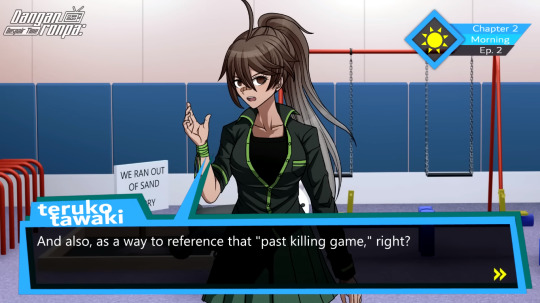
Teruko: And also, [MonoTV is designed the way it is] as a way to reference that "past killing game," right?
Assuming via context that she's talking about THH, MonoTV being specifically created and programmed to look and act sorta like Monokuma could have some interesting implications moving forward, especially given things like Duke Spurling being alive to see the Tragedy and maybe wanting a recreation of the THH killing game. Thankfully there's no character with a talent for recreating things, such as art, an art forger of some kind, because if there was this could realistically point to them as the mastermind. :)
Final note about theories: I... called it? Sort of?
[Extract from Vivisection of the David MV] What I think is the best idea [regarding the multi-colored "original"] is that all the characters [which includes MonoTV] got the word. [...] I think it makes more sense to relate them to the meaning of "original style" under my interpretation, where "original style" means a change of heart.
Well, MonoTV sure had a change of personality, albeit briefly, now didn't it? (Please ignore the fact that I dismissed the possibility of MonoTV changing in the lines following that one :p) Admittedly "characters in DRDT will have character development" is possibly my least wild theory ever, but a W is a W (?).
Alright but screw theorizing that's for insane people. Let's go for character analysis, because the fact that MonoTV has become a genuinely interesting creature to study is possibly even wilder than the XF-Ture Tech name drop.
Now, a lot of what we hear character wise is similar to stuff we heard in MonoTV's previous character building moment; CH2 EP3.

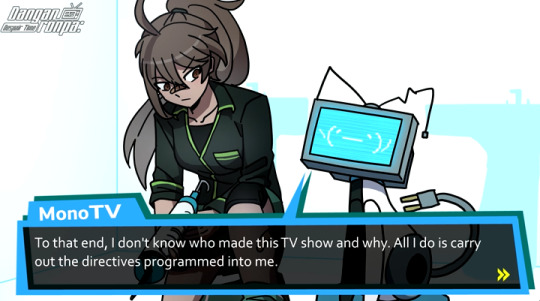
MonoTV: Does a toaster know why it toasts? Does a calculator know why it adds and subtracts? They are simply machines that do their job without needing to understand why. To that end, I don't know who made this TV show and why. All I do is carry out the directives programmed into me.

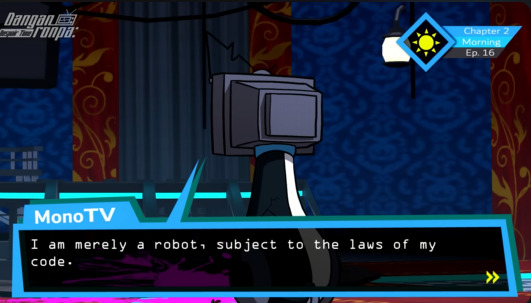
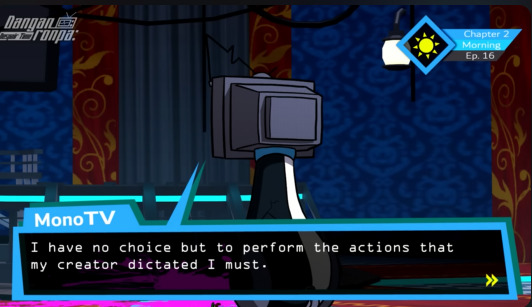
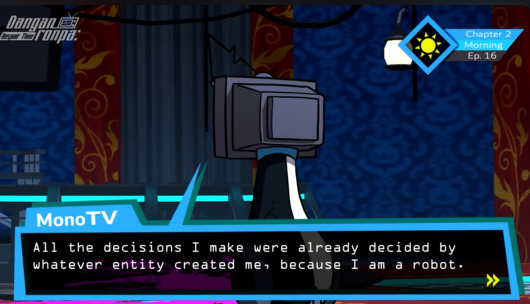
MonoTV: I have no conscience, no sense of morality, no will at all. I am merely a robot, subject to the laws of my code. I have no choice but to perform the actions that my creator dictated I must. [...] All the decisions I make were already decided by whatever entity created me, because I am a robot.
It's stated in a much more melancholic tone, given the music in the background, the sprite pose, and the generally less silly "default personality," but it's nothing really new. MonoTV is a machine, it follows programming.
Except.


MonoTV: Even if I feel pain or guilt, I cannot stop. That is the fate that I have, to make others suffer. And there is no diverging from that fate.
Hey MonoTV what the fuck does this mean.
"Even if I feel pain or guilt"? Instead of "I can't feel pain or guilt"? The choice of wording here is very interesting, because it seems to imply that MonoTV does feel pain and guilt over the killing game, regardless of how impossible that should be. The "fate" drop is pretty huge for thematic reasons, as I'm sure you're aware; Teruko explains her own feelings about it in the rest of the scene, there's Xander's speech to Teruko before he attempted to stab her, Ace talking about how he was too much of a coward to fight his fate, Arei actually defying a similar fate in a way, David with the LGI lyrics, Whit and J and Rose and so many other people, all interconnected by this damn concept. I think it'd be fine if this is all we hear about MonoTV in relation to it, but there's definitely fun parallels to explore regardless.
Given how little we have of these particular character details so far, there's not much I can say about it other than I love the concept of an AI being forced to do something it doesn't "want" to because of code, and I'm interested to see if MonoTV will act differently in the future. It's supposed to reset to its previous personality in the full reset, I imagine, but it's not like we can just ignore all the shit it said here. I'm very curious to see where dev takes this.
That said, I also wanted to point out how this vague allusion to feeling pain and guilt and possibly hopelessness against fate aren't the only feelings MonoTV exhibits. Because for some unfathomable reason, it seems to care about Teruko to an extent?

MonoTV: Is something the matter, Teruko? Everyone else has already left.
Like, maybe I'm misreading because the personality change is fucking with me, but this feels like a concern more genuine than I would expect from pre-2-16 MonoTV. And...

MonoTV: You have to decide the answer for yourself.
This, along with the little speech about Teruko's humanity that precedes it, again comes off as MonoTV genuinely trying to help her through her emotions. I don't see how this correlates with its purpose, unless it somehow "believes" that giving Teruko advice on this will somehow lead to Teruko killing someone or something to that effect, which makes no sense.
If it doesn't help kill the participants, isn't necessary for the killing game, and doesn't make MonoTV seem like a villain, then it's not related to any of its purposes. It isn't code making MonoTV say this things. It's MonoTV's... consciousness? I guess? It's very, very interesting.
I am genuinely super interested in where dev is taking MonoTV, and if you told me that was a sentence I would unironically type before this episode, I would have called you insane. The writing in this series is genuinely immaculate, I can't believe we're getting genuine basis for MonoTV angst and it's compelling. Dev does it again!
Thanks for the ask, this was fun to ramble about!
44 notes
·
View notes
Text
Al-Sawai, A. (2013). Leadership of Healthcare Professionals: Where Do We Stand?. Oman Medical Journal, 28(4), 285-287 3p. This study defines leadership as behavior that drives a group towards an identified goal, and it describes a variety of leadership theories (such as transformational leadership, collaborative leadership, conflict management and shared leadership), beginning with the "early Great Man theory" (the idea that some people have the quality of leadership and some do not). Its main purpose is to identify and describe several theories of leadership as they would apply to the health care industry. The finding of the study is that effective leadership strategies should highlight "dynamic relationships between leadership values, culture, capabilities and the organizational context." The evolution of leadership development is such that, today, the most important aspect of leadership is now based on making sure that "a ready supply of replacement leaders" is available at all times within the organization, so that progress within that workplace never hits a wall when a replacement is needed. A brief description of the various theories identified in the study is included and how they relate to nursing is explained. Becker, E., Armstrong, W. (2015). Establishing a Common Vision Among Healthcare Providers. TD: Talent Development, 69(9), 70-71. The delivery of health care is evolutionary and rapidly changing in today's world thanks to the advent of new technology. However, in order to effect sustainable change, strong leadership is a necessary foundation that every nursing organization must have in order to be successful. This study examines the practicality of creating a leadership development program through coordination with Wiley and provides evidence of successful joint efforts that have helped hospitals and health care organizations overcome obstacles and meet leadership goals. The nexus of the effort is the fact that "physicians and administration" participate in "leadership discussions together" -- in other words, all levels of upper tier sections of management are on the same page working towards the same solution. Each learns to respect the needs and concerns of the other and both sides come to have an appreciation for why certain needs must be met. Having administrators work with doctors to develop the appropriate leadership objective is what it means to have a completely ordered and unanimous team of oriented and focused individuals. Instead of working on the same problem from different approaches and getting the way of each other, the two are able to team up and create a single approach that addresses the needs of both participants. It is a style of collaborative leadership that Wiley makes possible through its training sessions and intervention processes as well as its guidance throughout the effort. Evans, J. (2014). Evolving Leadership in Healthcare Design. Health Environments Research & Design Journal (HERD) (Vendome Group LLC), 7(4), 9-12. This study discusses the elements/factors that are "being used to lead the design off the future healthcare delivery model" (p. 10) in today's nursing industry. A number of factors are identified, such as clinical expertise and ergonomic design. One of the important aspects that the study highlights is the fact that more healthcare professionals are taking part in the design process so that the overall schematic is more balanced and in tune with what real-world professionals need. The study promotes the concept of "interprofessional approaches to care and coordination of care" as a way to expand, deepen, strengthen and support any and every new model of care (p. 12). The study concludes with the assessment that more healthcare professionals are needed in a design formulating capacity so that clinical leaders can help in the translation process of theoretical concepts and designs to real-world clinicians. In other words, a more functional process is suggested as firmer bedrock in the design industry when it comes to establishing a facilitating model for healthcare professionals looking to lead and provide solutions to issues that do not have easy answers. Farley, K., Hanbury, A., & Thompson, C. (2014). Gathering opinion leader data for a tailored implementation intervention in secondary healthcare: a randomised trial. BMC Medical Research Methodology, 1438. doi:10.1186/1471-2288-14-38. Retrieved from: https://lopes.idm.oclc.org/login?url=http://search.ebscohost.com/login.aspx?direct=true&db=cmedm&AN=24606877&site=eds-live&scope=site This study focuses on the results of a randomized trial in a UK mental health NHS Foundation Trust. Participants were given two questionnaires: one questionnaire asked for a variety of nominations for opinion leaders as well as information about the respondent's relationship with the person nominated. The shorter questionnaire asked for just a list of nominees or "champions" and no other information. The results were then compared by Chi Square analysis. The low rate of return for each questionnaire, however, indicated that a different method of identifying and evaluating opinion leaders should be utilized as, the questionnaire-based method did not really maximize the potential of the organization's ability to self-determine leaders from within. Thus, as the study points out, identifying opinion leaders remains a challenging and difficult task in the health care industry. "Methods need to be robust, reliable, attract low resources and identify high quality opinion leaders" but the questionnaire method used in this study do not provide the necessary results or meet the expected parameters for a well-defined assessment. The study found that a truly successful assessment would require many more and much lengthier questionnaires. However, the fact that response rates were low for each of the questionnaires given in this study suggests that a questionnaire method of identifying leaders is not the best approach. Garvey, D. (2011). Management and Leadership in the Health Services. Academic Leadership (15337812), 9(3), 1-5.Retrieved from: https://lopes.idm.oclc.org/login?url=http://search.ebscohost.com/login.aspx?direct=true&db=ofs&AN=92605765&site=eds-live&scope=site This study examines the ways in which clinical leaders are developed so as to support the overall ability of an organization to the transform itself and evolve or rise to the next level of care provision. The development of clinical leadership is viewed as catalyst or engine for this transformation process. The study focuses on methods of Atrius Health and its health care delivery process and how well it meets the needs of the Massachusetts marketplace. The study also highlights the nature of education/development of healthcare leadership as well as what processes should be considered when drafting and implementing a new leadership program for clinicians in the healthcare industry. The study concludes by identifying a number of methods that can be utilized to more effectively construct an efficient leadership training and development program that will serve both the industry providers and the industry consumers in the new technologically-driven 21st century. As the marketplace becomes more and more digitally-dependent it is important that leadership appreciate the new solutions that technology can deliver especially in the light of teleheath possibilities which are becoming increasingly popular. Hart, P. L., Spiva, L., Baio, P., Huff, B., Whitfield, D., Law, T., & ... Mendoza, I. G. (2014). Medical-surgical nurses' perceived self-confidence and leadership abilities as first responders in acute patient deterioration events. Journal Of Clinical Nursing, 23(19/20), 2769-2778 10p. This study examines the perception of self-confidence that medical-surgical nurses have (as well as their leadership skills/qualities) when acting in first response capacity and treating patients with clinical deterioration ahead of the intervention of a team of emergency responders. The study utilized a prospective, cross-sectional survey to gather data from responders. Participants included nurses who were selected from a system of healthcare providers in the U.S. The survey included a questionnaire that incorporated demographic, leadership and self-confidence level questions. The study found that of the 148 participants, the overall self-confidence level of the nurses was moderate and the leadership ability assessment was equal. The study identified a positive correlation between perceptions of self-confidence and leadership. Likewise, experience (age) and status of certification served as a strong predictors of self-confidence/leadership. The study concludes by suggesting that education could help to support the promotion of self-confidence levels among nurse respondents as well as to enhance their leadership training/abilities in treating patients with clinical deterioration. Likewise, the study asserts that nurses should be certified so as to support this method and to deepen their understanding, skills and ability to meet the needs of patients in this predicament. Hui-Gek, A., Meng-Yeow Koh, J., Jeffrey, L., Yong-Hao, P., Ang, H., Koh, J. M., & ... Pua, Y. (2016). Development and preliminary validation of a leadership competency instrument for existing and emerging allied health professional leaders. BMC Health Services Research, 161-8. This study looks at a way to gauge leadership competency levels among allied health professional leaders. The study examines the properties of a leadership competency instrument that can adequately assess factor structure and validity. A cross-sectional method of data gathering was used among more than 100 Singapore hospital staff members of varying levels. The results indicated that "skills and values formed separate factors" in the overall establishment of leadership ability. The researchers conclude that a good instrument or model of assessing leadership among the selected group is the Aspiring Leaders in Healthcare-Empowering Individuals (AHEAD) and the Leadership Practices Inventory (LPI) which helps to assess competency in this healthcare sector. Kumar, S., Adhish, V. S., & Deoki, N. (2014). Introduction to Strategic Management and Leadership for Health Professionals. Indian Journal Of Community Medicine, 39(1), 13-16. This study observes that leadership is about providing so that the right thing can be done at the right time -- a lesson taught by Florence Nightingale. The problem that the study addresses is a lack of health care leadership in parts of the world such as India, the Middle East and Asia. The study asserts that there is no real leadership training in these areas and their schools and that the typical health care provider only gains leadership skills by trial and error, observation, and self-learning. The study compares management and leadership and notes the distinctions as well as how they complement one another. The study also provides a leadership model that is relevant for health care personnel: the Jim Collins model of five levels of leadership. The study concludes with the observation that in today's health care world, leadership and managerial roles are essential as a result of the impact of globalization in health care. There are rapid changes being introduced in technology, delivery and accountability, and the Jim Collins Level 5 model can help professionals understand what skills are needed when as they move up the hierarchy of development. The study asserts that "leadership can be learned" thus contrasting with the Great Man theory of early leadership studies. The study calls for a "government led comprehensive approach" to creating sound leadership skills by instituting a curriculum that addresses this need in India and other parts of the world where it is lacking. Mabbott, I. (2013). Reviews. Practical Leadership and Management in Healthcare: For Nurses and Allied Health Professionals -- Second edition. Nursing Standard, 27(50), 28-28 1p. Mabbott highly recommends this book for its good advice on leadership. The book acts as a go-to guide for anyone in a leadership position who has questions and/or needs tips on leading. The book's structure is divided into three sections and examines in a straight-forward manner the precise and practical issues that determine the quality of leadership and management today. It does so in a simple way, however, so that any person who is new to leadership in the healthcare industry can easily make his or her way through the book and come to identify and better understand nursing concepts and how they might actually relate to the real world. Case studies are utilized in the book to help to shed light on the concepts as they are discussed. All aspects of management are covered, from budgeting to time management, to recruiting and filling staff positions to clinical risk. The way the book is structured it can be used as an encyclopedia of leadership in nursing. MacPhee, M., Li-Lu, C., Havaei, F., & Wen-Shan, C. (2014). A Descriptive Account of an Inter-Professional Collaborative Leadership Project. Administrative Sciences (2076-3387), 4(3), 373-399. This study examines the outcome of a collaboration leadership exercise between a group of five "inter-professional teams" located at an urban cancer treatment center in Taiwan and the healthcare faculty plus professional development director. This workshop exercise resulted in the development of a new structure and process of workshopping ideas connected to leadership in the health industry. Instruction was provided by the academic faculty and discussions were facilitated by the professional development director's efforts among the five teams. Interactive exercises were also conducted to reinforce ideas and concepts taught by the faculty. Suggestions were made for better overall development of leadership skills, such as the continuation of appreciative inquiry exercises as well as the rotation of team members in leadership positions, so that each member gains more experience as the leader. The study concludes with a discussion of the fundamental elements of leadership as they were covered in the workshop as well as an assessment of the evaluation method, instructional strategies and expected results that a future program for increasing effective leadership in the healthcare sector could utilize. Read the full article
0 notes
Text
hello lovelies ! i’m bøffy , i’m 20 years old , prefer she/her pronouns , and currently reside in the pst timezone ! uhh . . . i am posting this intro at nearly 5 AM my time , and i would be almost willing to bet it’s littered with errors and it’s . . . probably a bit all – over – the – place since this is very much a new muse ! however , with that being said , if you give this a like , i will definitely contact you via tumblr ims or d!scord ( 𝓲𝓷𝓱���𝓵𝓪 / 𝓮𝔁𝓱𝓪𝓵𝓪#1384 ) to plot !

[ jasmine brown . 21 . cis female . she/her ] just saw MALEAH AMICK dragging their suitcase up the steps to CABIN 1B . good luck living with HER , i hear that that they’re INDECISIVE , FORGETFUL , SOCIABLE & CREATIVE . Apparently they’re the ATTACKING MIDFIELDER . let’s hope the upcoming season doesn’t affect their JUNIOR year of ART EDUCATION .
STATS:
name: maleah amick .
nickname(s): leah .
age: twenty one .
gender identity: cis female .
pronouns: she/her .
sexual orientation: bisexual / biromantic .
birthday: 26 february 1999 .
zodiac sign: pisces .
myer-briggs: esfj .
pinterest: coming soon !
HISTORY:
born on the 26th of february 1999 in orlando , florida , maleah was the youngest of the three amick siblings . her mother worked as a prestigious board – certified pediatric surgeon at a local children’s hospital , and her father worked as a high school mathematics teacher and volunteered as the school’s unpaid soccer coach , a move that saved the program from ending due to budget cuts ( he claims he was roped into the position as a first – year teacher with no seniority , but while he’s reluctant to admit it , he eventually grew a passion for the sport he had previously known little about ) .
with her mother’s long shifts and emergency work – related calls , she ultimately became closer to her father and two older brothers while growing up . most knew her father as a man who towered over them at 6’7” , ordering his team to run laps or practice drills ; however , maleah knew him as the man who would crawl around the living room floor playing barbies with her or would prepare fruit and herbal teas as she twirled around dressed as a princess , declaring it time for a royal tea party . just as easily , she could be found exploring the great outdoors or playing whatever sport was currently in season alongside her brothers .
she practically followed in her brothers’ footsteps . as they approached high school , each brother chose one sport to specialize in , hoping to secure a position on a college team and eventually on a professional team . maleah did not have professional athletic goals , but although she had immaculate grades with limited effort put towards academics , she knew extra – curricular activities were important for college applications . thus , when it was maleah’s turn to choose which sport to pursue , rather than having to weigh the pros and cons and make her own decision ( or perhaps , fearing that she would make the wrong decision ) , she simply chose the sport that her brothers had previously chosen : soccer .
her high school coach knew the perfect position for maleah . years of informal practice with her brothers in the backyard had enhanced her skills . she had learned how to evade skilled high school defenses by pretending as if she was heading in one direction before bolting in the other . soccer was one of the few areas in life in which she possessed enough knowledge to make quick and effective decisions ; she could read the field and immediately determine the best course of action : dribble , pass , or shoot . ultimately , she possessed the vision and the creativity necessary to secure playmaking and goal-scoring opportunities for her team .
with a line of college scholarships , both academic and athletic , waiting for the attacking midfielder’s choice ( unfortunately , none from either of the schools her brothers played for ) , the time came for maleah to make a decision . as deadlines for summer practices , class registration , and tuition payments crept closer , she finally determined a means of deciding . she numbered her offer letters , 1 through 13 , and allowed a random number generator to make the decision for her . thus , mere chance ( or perhaps fate ) led maleah to hollis university .
her first semester at hollis was . . . rough , to put it lightly . while most freshman shed a few tears as they watched their parents’ car drive off into the distance , homesickness lingered in maleah’s life . coasting through high school with limited effort had done her zero favors ; with no effective study skills , her grades dropped dramatically . between soccer and trying to salvage her grade point average , a social life was virtually out of question . ultimately , she found herself on academic probation , unable to play soccer , for her second semester of freshman year at hollis .
luckily , she was able to develop effective study habits , and even discovered along the way that maybe pre – med was not the best major for her . when asked what she wanted to do , maleah gave an entire list of generic answers – “i want to help people” and “i want to make a difference” came up quite often , but nothing specific enough to point her in the right direction . thus , she changed her major almost every semester , desperately seeking for the right fit . in the meantime , though it took several letters petitioning her temporary removal from the team , she was able to resume playing soccer during her sophomore year .
as junior year approached , maleah was almost certain that she was back in her coach’s good graces – no longer viewed with a sense of skepticism . she had proven herself capable , finding her name on the dean’s list nearly every semester and assisting her team in numerous wins throughout the soccer season . however , with hollis’ soccer teams’ restructuring , maleah can’t help but question if her coach views her as a valued athlete or a liability .
PERSONALITY:
two words : social butterfly . almost to a fault . even if someone has expressed quite literally zero interest in talking to her / getting to know her , she will still make an attempt . kind of a . . . people – pleaser , in a sense , she just wants to be well – liked ?
avoids ! conflict ! at ! all ! costs ! generally just . . . tries to avoid people or situations that upset her . not very prone to like . . . yelling or crying , but those close to her can definitely sense a change in her demeanor when she’s upset ? just . . . a lot more tense , probably lots of eye – rolling and just . . . subtle , quiet signs that she is over whatever the problem is .
kinda . . . chill , mellow , easygoing ? she very much lives in the moment , and tries not to stress too much about the future . always down for a drink , a party , whatever – genuinely just around for some fun and some friends !!!
the kind of person who genuinely gets excited over like those fun facts and jokes that are on popsicle sticks and whatnot – absolutely must share the information with everyone within earshot . honestly , those jokes are very . . . on point with her own personal sense of humor jflakdsj .
HEADCANONS:
she suffers from a terrible case of youngest child syndrome . ultimately , without guidance , she’s terribly irresponsible . she’s always having to run extra laps because she sets her alarm too late to make it to morning practices on time . she’s always receiving overdraft fees for spending more money than is available in her checking account . forgets everything – from homework assignments to names to grabbing her keys before locking the door on her way out . just . . . imagine a child asking for an adult’s help and her looking around until she comes to the realization that “ oh , shit , i am an adult ” .
she’s practically always doodling – in the corners of notebooks , on napkins while eating lunch , on her clothing , on her own skin . she loves making art , particularly drawing or painting portraits or nature . ( ultimately , she only decided to incorporate this into her choice of major after hollis threatened to not allow any further changes to her major ) .
she has a . . . unique sense of style . she has a passion for thrifting and upcycling . practically lives in hoodies and t – shirts that she has purchased from secondhand stores and cropped herself . always adding cool iron-on patches to her clothing . she should be listed as your emergency contact if you’re prone to ripping your clothing because she can definitely fix it .
she probably thinks she’s good at trash-talking on the field , but she actually sounds like a second grader ( and that’s being kind ) . if you looked at her browser history , there’s probably at least one record of her actually googling “ best soccer trash talk ” .
CONNECTIONS:
friends !! friends she’s met through courses throughout her adventures of attempting every major possible , mayhaps soccer friendships that continue off the field , mayhaps that complicated emerging new friendship state for some who are new to hollis ! unlikely friends ! best friends !!! quite literally those unbreakable ride – or – die friendships !
muses !! i feel like every artist needs that little dose of inspiration , even if it’s simply the inspiration of a work – in – progress portrait throughout the duration of camp ! complaints of “ stop moving ! ” and her stopping every ten minutes to ask what they think and probably at some point , her flinging a brush dripping of paint in their direction (if things didn’t end in an all – out paint fight djlfakds ) .
enemies !! honestly i’m sure there is ?? so much ?? potential for this , bt . . . mayhaps someone’s just . . . fed up w her irresponsibility ? thinks she doesn’t take her soccer position seriously ? maybe someone doesn’t think she takes anything seriously ( they wouldn’t be . . . wrong tbh ) . maybe someone from cali takes that “ california vs florida ” feud a little too seriously jflskdja . idk there’s always bound to be personality clashes !
exes !! relationships that ended badly , so she actively tries to avoid them and who even knows what happens when she’s forced to acknowledge their existence at some point at this camp !!! maybe relationships that ended on mutual terms so they’re still p chill with each other ?? maybe ended relationships that never quite got closure so there’s still unresolved feelings !!
hook-ups !! they are . . . college students . they are . . . college students stuck at a camp all summer . idk i feel like this one is pretty self – explanatory jflakds .
honestly i am tired & want to sleep , bt genuinely i am up for & open to anything ! good influences , bad influences , unrequited crushes , requited crushes , idk the world is y(our) oyster !! these are . . . rlly just some ideas to get the whole process started bc i am actually terrible at . . . thinking of plot ideas on the spot . always open to jst . . . doing a thread and seeing how things naturally flow too !
#hollis.intro#i . . . don't know what most of this is#it is jst#almost 5 am now actually i need sleep#also too lazy to log on to my other account to access my other gifs so :) this is what we have to work with for the time being jflaksdj
14 notes
·
View notes
Link
2 notes
·
View notes
Text
Things
Was scrolling through my blog yesterday (because who doesn’t scroll through their own blog?) and realized that I haven’t done a life update/list of random thoughts in awhile and I honestly like to look back at them and be reminded of where I was in life at different times + it’s a good way to flesh out my thoughts
So! I guess we can start with law school-I have heard back from 8 out of 9 schools and I have incredibly mixed feelings, I have only been accepted to two schools, and they were two safeties, I have been waitlisted at FOUR and straight rejected from 2 (will go into more details once I have finalized my decisions). Honestly I feel like the two schools that appear to be my options right now in a weird backwards way really are the best choices (at least for my mental health and happiness) because they are in the locations I prefer by far BUT I have also felt a LOT of stress because the legal field is one that places a LOT of emphasis on where you went to school and it seems like if you aren’t at a T-14 you might as well get out now...it’s ironic because when I was applying to undergrad I was so crazy about wanting to go to the school with the best name and seem impressive and when I first started the law school process I just wanted to go where I would be happy and then I found out how much the name matters and I was like wait what no go back. BUT, the schools I have gotten into have AMAZING programs for my specific field soooo Idk, it’s all a give and a take, yeah they aren’t the most prestigious school in the world but they have incredible opportunities for what I want to do and I think that matters too. I’m going to go visit both of them in the next month or two and I’m excited
^also, like I said, mixed emotions. even though I feel like the schools I got into truly are where I will be happiest, I have been feeling a LOT of disappointment in myself for essentially feeling like I ~failed~ in my quest to get into these other schools. I am a super type A high achiever and honestly the past year has been very out of character for me. Sure on paper I did a ton of cool shit and traveled a lot and now I’m working in an impressive position I suppose but I have just felt...off. Like giving 100% of my effort to something is pointless and I have no desire to, and I don’t like that! that’s not me! at the same time I know the admissions process is literally a game. Half the time schools don’t let you in because they think they are your safety and you’re too good and you won’t actually come so they don’t want to waste their space on you, the other half of the time they really aren’t your safety and they are an amazing school but they know that even if you are good enough to get into them, then you’re probably good enough to get into other amazing schools and again, you won’t actually come. IT IS REDICULOUS. and then of course sometimes you really just aren’t good enough but I am SURE that some of my schools are playing this game which on the one hand makes me feel better about myself because wtf is there for me to do in that situation but on the other hand....WTF.
^^also, also I listened to a podcast months ago that someone here actually recommended about the LSAT and they mentioned how big of a deal your score is in determining if you are admitted to a school or not and I 100% believe it. I think my score is a large part of why I’ve had the outcome I have. And that sucks. Because my score is good enough to get me really, really good scholarships to most schools, but not quite good enough to get me into the best schools. And I want to get into those schools. Also I lost my mind studying for that test and I literally just had a bad day on the test day. I never have test anxiety but at the end of the first section I got overwhelmed and just blew it. And that’s what really kills me. I spent months studying, preparing, devoting SO much time to get a score that was literally exactly the same as what I got on my first practice exam. And it was just because I had a bad day.
But it be like that sometimes I suppose!
Okay anyway....so yeah law school things are almost done and I’m honestly really just excited to know where I will end up...also where jared will end up. So far he has been accepted to 2 PhD programs which is really, really exciting because they are HARD to get into...and I think he will get into more because he is a great candidate. It’s crazy to think that we will be long distance for at least 3, maybe 6 years...it’s crazy to even think that it would be possible to be long distance for 6 years because like wtf. I feel like an idiot even thinking that. But in all honesty we have no idea what could happen and it could be much shorter than that or maybe we aren’t even The Ones for each other but...crossing all of these bridges when we get to them.
Keeping on the subject, living together has been really, really hard if I’m being honest. Sharing a small space with another person...sharing a BEDROOM has been rough because so much of me managing my mental health comes from alone time and having a chance to process things and recharge (also I’m an only child so....alone time). Also, like I’ve said, working at the same place is nice in some ways but it means were are together sooooooooo much of the day (not actually when we are working but on the way to work, way home, never being home really when the other one is at work because we commute together, etc.). It’s been a tough adjustment. I feel like moving in with your partner can be hard and nobody talks about it so hello world here I am talking about it.
but at the same time it sucks because I keep feeling like I Need To Enjoy Every Second Of This Right Now because we are going to be apart for 34234112412424 years
But living together aside, jared is still just as incredible and wonderful and loving as ever and I appreciate him so much
It’s also kinda crazy that we only have like 2 months left here and they are SO busy. I think we only have 4 weekends that we are both here at the same time with no other plans. Because he has 2 grad school visits, I have 2 law school visits, he has to travel for a family event, his parent’s are visiting one week, my mom is visiting one week, etc. And we still have so much to cross off of our california bucket list
That being said I think we might take a few weeks to road trip around the west coast in may because 1. I want to travel a lot this summer and 2. we are here 3. there is so much to see out here and a lot of stuff that I wouldn’t necessarily want to take an entire trip to see in the future but places I would want to spend a day or two visiting
Think: California national parks, OR, WA, vancouver, etc. Depending on where we both end up going to school aka where the car needs to get to we have talked about driving through canada a bit/the northern U.S. (I’m looking at you glacier national park)
But it’s all very up in the air (much like our lives) so we shall see!
Food stuff....idk, I’ve felt stressed just because my anxiety in general has been high and that applies to food because food is part of my life but overall I know I am in a good place, or at least I am continuing the general upward trajectory. I was looking through old food posts on here and realizing so many places where I have come so far even in just a year. A few examples- I honestly love beer and wine (and whiskey) and I enjoy going to breweries or opening a bottle of chilly white wine to have with dinner once in awhile or ordering a fancy cocktail, and I think enjoying alcohol is fun! and normal! and for so long I told myself I didn’t like to drink because I was so scared of the calories in alcohol and how it didn’t have any nutritional value and was a ~waste~ but it is fun and social and often delicious and I don’t stress about it and I enjoy it when I want it and I don’t have it when I don’t! I think college is also just weird because alcohol use is often just about Getting Drunk whereas as you age I feel like you are more often drinking because something sounds good or because it’s a holiday or w/e. Idk it just isn’t as drastic if that makes sense. Other food things that have changed- I used to be so scared of burritos specifically and now I literally eat them all of the time because they are delicious. There are others but this is already so long so I’ll leave ya with those.
Another related food thing- I feel like I used to be so stressed about food because I was terrified of gaining weight (I guess? I don’t even think it was that I think it was just about being in control.. but anyway) but now I feel like most of my food stress just comes from the fear of feeling uncomfortable- i.e. it’s saturday and 3pm but I feel antsy about eating lunch so late because I don’t want to not feel hungry at dinner time. I have SO much more trust in my body and I literally never worry about it changing in a drastic way because....your body does not really want to change in a drastic way unless you are doing something drastic (or it needs to change to be healthy) in the first place
wow who knew I had so much to say I’ve been typing for like 20 mins and don’t feel like I’ve even gotten into the exciting little details but I should probably stop now because SOMEONE is gonna read this and I don’t want your eyes to fall out of your head (or my fingers to fall off)
25 notes
·
View notes
Text
10 Steps to Confirm a Planet Around Another Star
So you think you found an exoplanet -- a planet around another star? It’s not as simple as pointing a telescope to the sky and looking for a planet that waves back. Scientists gather many observations and carefully analyze their data before they can be even somewhat sure that they’ve discovered new worlds.
Here are 10 things to know about finding and confirming exoplanets.

This is an illustration of the different elements in our exoplanet program, including ground-based observatories, like the W. M. Keck Observatory, and space-based observatories like Hubble, Spitzer, Kepler, TESS, James Webb Space Telescope, WFIRST and future missions.
1. Pick your tool to take a look.
The vast majority of planets around other stars have been found through the transit method so far. This technique involves monitoring the amount of light that a star gives off over time, and looking for dips in brightness that may indicate an orbiting planet passing in front of the star.
We have two specialized exoplanet-hunting telescopes scanning the sky for new planets right now -- Kepler and the Transiting Exoplanet Survey Satellite (TESS) -- and they both work this way. Other methods of finding exoplanets include radial velocity (looking for a “wobble” in a star's position caused by a planet’s gravity), direct imaging (blocking the light of the star to see the planet) and microlensing (watching for events where a star passes in front of another star, and the gravity of the first star acts as a lens).
Here’s more about finding exoplanets.

2. Get the data.
To find a planet, scientists need to get data from telescopes, whether those telescopes are in space or on the ground. But telescopes don’t capture photos of planets with nametags. Instead, telescopes designed for the transit method show us how brightly thousands of stars are shining over time. TESS, which launched in April and just began collecting science data, beams its stellar observations back to Earth through our Deep Space Network, and then scientists get to work.

3. Scan the data for planets.
Researchers combing through TESS data are looking for those transit events that could indicate planets around other stars. If the star’s light lessens by the same amount on a regular basis -- for example, every 10 days -- this may indicate a planet with an orbital period (or “year”) of 10 days. The standard requirement for planet candidates from TESS is at least two transits -- that is, two equal dips in brightness from the same star.

4. Make sure the planet signature couldn’t be something else.
Not all dips in a star's brightness are caused by transiting planets. There may be another object -- such as a companion star, a group of asteroids, a cloud of dust or a failed star called a brown dwarf, that makes a regular trip around the target star. There could also be something funky going on with the telescope’s behavior, how it delivered the data, or other “artifacts” in data that just aren’t planets. Scientists must rule out all non-planet options to the best of their ability before moving forward.

5. Follow up with a second detection method.
Finding the same planet candidate using two different techniques is a strong sign that the planet exists, and is the standard for “confirming” a planet. That’s why a vast network of ground-based telescopes will be looking for the same planet candidates that TESS discovers. It is also possible that TESS will spot a planet candidate already detected by another telescope in the past. With these combined observations, the planet could then be confirmed. The first planet TESS discovered, Pi Mensae c, orbits a star previously observed with the radial-velocity method on the ground. Scientists compared the TESS data and the radial-velocity data from that star to confirm the presence of planet “c.”
Scientists using the radial-velocity detection method see a star’s wobble caused by a planet’s gravity, and can rule out other kinds of objects such as companion stars. Radial-velocity detection also allows scientists to calculate the mass of the planet.

6. …or at least another telescope.
Other space telescopes may also be used to help confirm exoplanets, characterize them and even discover additional planets around the same stars. If the planet is detected by the same method, but by two different telescopes, and has received enough scrutiny that the scientists are more than 99 percent sure it’s a planet, it is said to be “validated” instead of “confirmed.”

7. Write a paper.
After thoroughly analyzing the data, and running tests to make sure that their result still looks like the signature of a planet, scientists write a formal paper describing their findings. Using the transit method, they can also report the size of the planet. The planet’s radius is related to how much light it blocks from the star, as well as the size of the star itself. The scientists then submit the study to a journal.

8. Wait for peer review.
Scientific journals have a rigorous peer review process. This means scientific experts not involved in the study review it and make sure the findings look sound. The peer-reviewers may have questions or suggestions for the scientists. When everyone agrees on a version of the study, it gets published.
youtube
9. Publish the study.
When the study is published, scientists can officially say they have found a new planet. This may still not be the end of the story, however. For example, the TRAPPIST telescope in Chile first thought they had discovered three Earth-size planets in the TRAPPIST-1 system. When our Spitzer Space Telescope and other ground-based telescopes followed up, they found that one of the original reported planets (the original TRAPPIST-1d) did not exist, but they discovered five others --bringing the total up to seven wondrous rocky worlds.

10. Catalog and celebrate -- and look closer if you can!
Confirmed planets get added to our official catalog. So far, Kepler has sent back the biggest bounty of confirmed exoplanets of any telescope -- more than 2,600 to date. TESS, which just began its planet search, is expected to discover many thousands more. Ground-based follow-up will help determine if these planets are gaseous or rocky, and possibly more about their atmospheres. The forthcoming James Webb Space Telescope will be able to take a deeper look at the atmospheres of the most interesting TESS discoveries.
Scientists sometimes even uncover planets with the help of people like you: exoplanet K2-138 was discovered through citizen scientists in Kepler’s K2 mission data. Based on surveys so far, scientists calculate that almost every star in the Milky Way should have at least one planet. That makes billions more, waiting to be found! Stay up to date with our latest discoveries using this exoplanet counter.
Make sure to follow us on Tumblr for your regular dose of space: http://nasa.tumblr.com.
#nasa#space#solarsystem#science#exoplanet#star#scientists#telescope#tess#kepler#asteroids#gravity#milkyway
2K notes
·
View notes
Text
Self-Image can feel so damn humiliating.
Fat to Skinny: self-Image can feel so damn humiliating.
“A strong, positive self-image is the best possible preparation for success.” – Joyce Brothers
Isn’t it true self-image can feel so damn humiliating? What do you think it feels like to honestly really hate yourself and your body? Thinking you need to go from fat to skinny is my definition of being so mean to yourself…
When you find yourself looking into a mirror and thinking ‘ew, I’m so fat,’ and ‘shit I need to get more make-up, I’m out of foundation and I look pizza dragon face,’ it’s heart-breaking, as well as confusing due to the fact it’s not true.
A positive self-fulfilling prophecy is something we all need!
It isn’t about going from fat to skinny!
Stop worrying about “fat to skinny,” ideas and appreciate yourself.
Though it’s common, many hide their emotions and lather up in make or snakeskin oil in an attempt to nail new styles and trends.
Unfortunately, the truth behind these flawless magazine covers is they are touched up by professional software, such as Adobe’s “Photoshop.”
Yes, the women featured in Vogue, and other magazines alike are very gorgeous in real life, but the industry tends to push it the extra mile by editing their pictures to a T.
Consequently, it’s programmed into our minds that we all need to look a certain way, walk a certain way and talk a certain way.
I fail to agree with most of those magazines and ridiculous expectations but they will always be apart of our world, constantly evolving.
Admittedly, I have looked in the mirror and felt the very same thing, so much that living in my body felt like a prison.
Evidently, a diagnosis of Crohn’s disease at the highest moment in life tore me to the floor. I was the fittest ever, with 16% body fat and at least four abs. And it felt damn good but then life became hazy.
Imagine being your fittest, your happiest and watching your body crumble in front of the mirror due to all the medications you have to take in order to live a half-decent normal life.
Next comes the job where you work with absolutely flawless looking CEOs, publishers, talent, etc.
What would happen when you focus on going from fat to skinny?
Well, I’ll tell you what “could happen,” since we are all different. First, you may obsess with the thought of “how can I go from fat to skinny?”
The happiness leaves, it was fucking humiliating to have stretch marks and not even reached a point in my life where I had a baby.
The way my body was “supposed to be,” left due to Cushing’s syndrome.
People judged my job performance and then I assumed my disease would keep me from getting any decent writing job.
I felt as though I was inspiring others but I hated myself.
My fucking kinkiness sex life went down because I was too embarrassed to take off my shirt.
I had to shave my hair that touched my ass, all that way down to a “Ruby Rose,” cut, which was hard to digest.
Lastly, hating myself set in and I lost track of who I truly was, all because of an expectation, I didn’t change, my body did, right?
Finally, it hit me: I’m being so fucking mean to myself because it doesn’t matter who you are, how much you weigh, or what you do in life, you are and will always looking amazing and you should be proud of your battle scars.
Why worry about going from fat to skinny?
Elevate your self-image, forget about fat to skinny!
Elevate yourself because you deserve it, you deserve to be proud of any “imperfections.”
Further, those imperfections are what make you damn perfect.
Most importantly, you don’t need to beautify yourself to get a good job or find a good man or woman, frankly, you merely have to be proud of who you are as a whole.
Lastly, take the time to love your self-image, your mental toughness and be who you want to become, life is too short to hate on others, including yourself, let the trolls be trolls.
You’ll be making positive emotional changes while they sit and whine about whatever the hell they want for the rest of their life, that sounds miserable.
If you want “it” (whatever IT is) you can have it believe in yourself, and understand your self-image doesn’t define your future jobs, friends, love life, etc.
Just as Demi Lovato, Justin Bieber, Katy Perry, Kesha, and many others we look up to say, love yourself.
Blessed be!
The post Self-Image can feel so damn humiliating. appeared first on Positive Celebrity News and Gossip.
No related posts.
from WordPress https://positivecelebrity.news/2020/01/29/self-image-can-feel-so-damn-humiliating/
1 note
·
View note
Text
Inanimate (Machine!Connor x Reader)
Characters: Machine!Connor, Reader
A/N: Had this idea for years and finally figured out how to write it. Let me know what you think xo I promise to write some fluff soon; enjoy guys x
Warnings: Angst, swear words. Smoking (don’t smoke guys!)
word count: ~1.2k | masterlist
Your voice has always been a dangerous whisper. Carried by the wind, sowing doubts in his orderly functioning brain. A grain on an otherwise smooth surface.
“Connor.”
There it is, that whisper that doesn’t go unnoticed by his audio processor. Your breath hitches slightly as if his presence is like a piece of food stuck in your esophagus, making the air stumble around it until you’re breathless.
The android walks over to where you stand, with your back casually leaning against the railing. His movements are calculated and sharp and he scans his environment while walking – scans you.
Your heartrate is elevated, your wide eyes are filmed over, a thin veil of tears threatening to spill over, and your lower lip quivers. Dark bags showcase that you haven’t been sleeping and you’re fiddling with a cigarette between your fingers.
It’s your eyes that capture his interest most though. They never stray from his own, gazing into him, swimming with so much unadulterated emotion, his social relations program tells him to pose a question to make sure you are in good condition.
“Detective,” his voice is smooth like silk, “Are you alright?”
“Fuck, yes. Sorry Connor.” You shake your head and make a vague gesture towards him, “The whole returning-from-the-dead-thing has me on edge, is all.”
He tilts his head inquisitively. “My predecessor was unfortunately destroyed. This should not have such an impact on you, Detective.”
“You look very human when you die, did you know that?” There it is again, your voice. Warmth is seeping through every word you say, your eyes holding so much kindness for him, for a machine. They are jumping between his, searching, inquisitive.
He knows what you hope to find.
It is nothing he could give.
“I do not die. I shut down. Please don’t confuse the two.”
You frown and take a drag of your cigarette before you quip back, “Your eyes become dull and your LED dies out—” a shudder racks your body at the mental image— “I call this dying.”
Connor doesn’t reply immediately. He studies you and another shiver runs down your spine. He might as well have x-ray vision for it feels like his gaze is turning you inside out.
“I must inform you that your attachment is misplaced and hinders the progress of the investigation.”
“Is that your social relations program trying to comfort me?” you muse but your voice sounds strained, tired, “Because it’s fucking shit at it.”
You toss the cigarette over the railing and wrap your arms around yourself, avoiding looking at Connor. He doesn’t say anything for a while but you can still feel his eyes on you. Groaning, you let your head fall back and huff out a sigh. “Look, I know you don’t want to hear this but seeing you die and come back every fucking time is not fun! It’s like I keep losing someone I care for over and over again!”
Connor stares blankly at you, eyes void of any emotion. He can’t understand the pain in your eyes, can’t understand why it would bother you, for he would always come back the following day. A machine, replacing another machine. And frankly, he doesn’t care for your pain, even when your voice tries to claw its way into his mind palace, tugs at his wires to shape him into what you hope him to be. But Connor is inanimate, an object. He is unable to feel, acts based on priorities and percentages and you are not able to shift them.
“Then perhaps you should stop caring and treating me like a human. I’m a machine (Y/N).” he suggests, and his voice is eerily calm, “Don’t you think I haven’t noticed your heartbeat spike and pupils dilate whenever I’m around?”
Your head whips around, your eyes lock with his and you’re sure there is an audible crack from the cut that tears open your heart. “W-what are you saying?”
“I’m saying that I can’t let your emotions get in the way of my mission,” Connor snarls, “So you should ‘suck it up,’ as you humans say and get over it!”
You blink, startled by the amount of malice that is laced in his words, and grip the railing behind you. Despite the sunny November afternoon, you feel like someone has dialed down the thermostat, goosebumps running up and down your arms. But the cold is coming from within yourself.
You don’t want to hear this. Any of this.
“I can never reciprocate your feelings. I do not feel emotions. I’m a machine designed to accomplish a task and that task is not to be your boyfriend.”
“I’m sorry, okay!?” you shout, taking a step towards him, “I didn’t choose to fall in love with you, that’s not how it works!” Tears are falling from your eyes, tickling your cheeks, and you sniffle.
Seconds pass without either of you saying a word, then you mutter, “It’s not easy for me either. I didn’t want any of this, I knew it was hopeless, but the feelings just don’t go away.” You glare at him through the veil of tears, “I’m trying but they just won’t go away!”
“You’re not in love with me, (Y/N),” his voice is still smooth, void of emotion, machine-like, “I am not a person. My reactions are pre-programmed, you’re infatuated with an idea, a line of code.”
“That’s a load of bullshit!”
You love him, you do. Desperately so. You love him more than you had ever loved anyone before, your stupid human heart unwilling to let go. But his words hit deep, especially accompanied with that look he gives you, a look of pity.
Poor, frail human, stupidly in love with a machine. Pathetic human, controlled by her own emotions.
He is looking down at you, and the daydreams of Connor, allowing himself to feel, letting you help him discover emotions, falling in love with you, they all shatter and are replaced by nightmares.
Connor is a surgeon, dissecting your heart and putting it back together, leaving chunks on the floor he doesn’t deem fit for his mission.
Loving the android sent by CyberLife has always been like falling into an endless, pitch-black abyss. There was no stopping you, even though you knew how painful the landing would be. Yet you always had a tiny glimmer of hope that maybe, he could learn – a flame you fostered with daydreams and possibilities.
He has taken that hope from you. Has quenched the flame and slammed your body to the ground covered with spikes.
He doesn’t love you. He doesn’t even care, is not able to, will never be.
You break, the pain like someone is carving out your insides, and you give in. Your body slumps to the ground, legs too weak to carry your body. The lump in your throat feels like a noose around your neck, allowing only stuttered intakes of breath as sobs shake you.
And Connor just stares, unfazed. “I hope my clarification will help to facilitate the progress of the investigation in the future, Detective.” He turns to leave then, only to stiffen for a second and adding, “Please be mindful of your nicotine use. It could cause you great harm.”
You can’t believe he— no, his programming— has the audacity to fabricate care for your physical health when, in the same moment, he crushes your heart and leaves you broken beyond repair.
The door to the rooftop closes behind him with finality and you’re left to pick up the broken pieces and stitch them back together to what once has been you.
#connor x reader#dbh connor x reader#dbh connor imagine#connor imagine#dbh fanfiction#detroit become human x reader#dbh x reader#connor rk800 x reader#connor rk800 imagine#dbh imagine#angsty angst#machine!connor#machine!connor x reader
175 notes
·
View notes
Text
The United States and the Paris Climate Agreement
Dalton Young
International Relations
Position Paper (Topic 3)
The Paris Climate Agreement is a program set up as a voluntary action program that some countries apart of the United Nations (UN) take part in. The agreement essentially lets countries set their own goals on reducing carbon emissions and reducing the effects of climate change. There has been a lot of debate regarding climate change as a whole, even though there have been numerous studies published supporting the arguments that predict our climate is indeed changing. One reason light has been shone on the Paris Agreement once again is the United States’ withdrawal from the Agreement in June of 2017. This act by the President sparked a debate within the United States between climate change advocates and climate change denialists. Climate change is a real issue and is supported by trusted scientific minds and its effects are felt all around the world despite opposing views on the issue. Thus, I would argue that the facts support REMAINING in the Paris Climate Agreement.
First, we must establish why climate change is an issue that is worthy of possible global cooperation. It has been talked about and labeled a major issue by well known and respected scientists, such as Bill Nye, Neil deGrasse Tyson, Stephen Hawking, Carl Sagan, and many others. In addition to these brilliant minds, many United States military officials also support that notion that climate change is an issue that must be dealt with. William Wanlund states, “U.S. military officials increasingly view climate change as a “threat multiplier,” a factor that can aggravate poverty, political instability and social tensions. That, in turn, could foster terrorism and other forms of global violence while impairing America's military effectiveness.” These are trusted United States officials that are saying this is an issue. This isn’t just about the United States, but in terms of the benefits to the United States, being able to keep coastal military bases on the coast instead of underwater would be a tremendous benefit. Wandlund also says, “Rising seas, due mainly to Arctic ice melting, already threaten Naval Station Norfolk in Virginia, the world's largest naval base; dozens of other coastal installations also are at risk.” If our military installations are at risk, logically, a country that spends over 600 Billion dollars on its military every year would want to do something to protect coastal bases.
In addition to outright denying climate change, there are people who don’t deny it is happening, however they deny that humans are the cause. Nicola Jones from Yale states, “Frighteningly, this modern rise of CO2 is also accelerating at an unusual rate. In the late 1950s, the annual rate of increase was about 0.7 ppm per year; from 2005-2014 it was about 2.1 ppm per year.” This increase in acceleration rate is scary, as we have already passed the threshold of 400 parts per million of CO2, which itself is a very dangerous amount in its own right. Since it has been increasing at an unusual rate, we can induce that the majority of climate change is very likely due to human action. This is a hard pill to swallow, but it is the most likely scenario, and since we live on this planet and our future (or current) children will be living on this planet, we must do everything we can in order to preserve it and keep it as a livable place for generations to come.
Thus far, climate change as a whole has only been discussed, however, we must also think about the option of rejoining the Paris Climate Agreement. This agreement allows us to set our own standards for reducing our carbon emissions and reducing the amount of carbon in the atmosphere. There are a few reasons to support rejoining the Paris Agreement. First, there is the fact that many countries look to the United States as an example and as a world leader. Whether we like it or not, we will be scrutinized and observed in more ways than most other countries would ever imagine. Because of this, we have a responsibility to take charge and to lead the world into combating climate change. However you look at the International scene, this matters for one reason. We cannot be the greatest country in the world if there is no world with which to live upon. The only way we can cement ourselves as the greatest country of the modern era is to protect the only world that we have (as of right now). Secondly, rejoining the Paris Climate Agreement, to bolster our own economy in the green energy field of economy. If we do not engage ourselves in combating climate change as a government, then we cannot expect independent companies and corporations to go out of their ways to develop green technologies to replace coal and oil. The only time they will do so (if they have not already) is when the world inevitably runs out of coal and crude oil. Even if you don’t believe in climate change, despite the insane amounts of evidence that supports it, you should know that coal and oil are not infinite sources of fuel. This can be shown in your everyday life by looking at local petrol (or gasoline) prices at different stations in your area. Gas is much more expensive today than it was 50 years ago and that has to do with the supply of gas compared to the demand. Either way, this means that one way or another, the Paris Climate agreement would benefit the United States by providing incentive to create and produce greener and more sustainable energy providers.
In regards to counter arguments against remaining in the Paris Agreement, Wanlund states, “Some politicians and economists argue that the real danger to U.S. security lies in the erosion of jobs, trade and industrial productivity caused by the costs of unnecessary federal environmental regulations.” We must address the elephant in the room, one that I mentioned earlier. Military spending. The United States has the most expensive and funded military in the world at 649 Billion US Dollars in 2018, according to the Stockholm International Peace Research Institute. That is almost 400 billion USD more than the next most expensive military (China, 250 bn.). Some would argue at least 100 Billion USD of that money being pumped into the US Military is a little unnecessary, so I personally do not buy the argument that it would be too much for the United States to shoulder that load financially. Even if it is a multi-billion dollar program, the Government could cut back on military spending to A. better the world, and B. bolster the United States’ green energy economy. Regarding the argument on speed of industry, the reason we pay so little for things in the United States is because of the cheap and borderline slave-like labor in developing countries. If we sacrifice a little productivity to benefit the lives of our citizens and other citizens around the world, then that would be a noble reason for doing so. We should see it as granting basic human rights to those working and producing products internationally for the United States.
There are areas in the United States that would benefit from an effort to cleaning up pollution in the air, water, and land. One of these areas in the US specifically is the state of Utah, specifically in the Salt Lake Valley. The most densely populated area in Utah has one of the worst air pollution situations in the United States. Natalie McGill says the following on Utah’s issue with pollution, “...the state has a tricky situation. Because of the state's geography, the air quality starts to dip when cold air is caught under warm air, trapping a hotbed of pollution throughout Utah's valleys.” When you compound this issue on top of the coal-based steel mills scattered throughout the Salt Lake Valley, that spells bad news for young children and elderly people all across the state. Utah is just one of the states that are affected by pollution and climate change, rejoining the Paris Climate Agreement will allow the United States to set goals at the federal level, and/or state level to help each state individually reduce their footprint and keep their citizens healthy and happy.
In conclusion, rejoining the Paris Climate Agreement would be vastly beneficial to the United States. This means we can show and prove ourselves as a real world leader in tough situations, like climate change. Economy, money, and jobs will not be an issue as taking away a fraction of the money from the military’s ridiculous budget would be more than enough to fund any climate project you could ever think of. I strongly urge you to consider rejoining the Paris Climate Agreement as we can not be the best country in the world, if there is no world with which to live upon.
Bibliograpy
Lam, Anita, and Matthew Tegelberg. "Witnessing glaciers melt: climate change and transmedia storytelling." JCOM: Journal of Science Communication, vol. 18, no. 2, 2019, p. 1F+. Academic OneFile, http://link.galegroup.com.ezproxy.greenriver.edu/apps/doc/A583145703/GPS?u=aubu98092&sid=GPS&xid=dd804a69.
Wanlund, W. (2017, September 22). Climate change and national security. CQ researcher, 27, 773-796. Retrieved from http://library.cqpress.com/
“Scientific Consensus: Earth's Climate Is Warming.” NASA, NASA, 24 Apr. 2019, climate.nasa.gov/scientific-consensus/
Paris Climate Agreement UN Climate Change https://unfccc.int/sites/default/files/english_paris_agreement.pdf
Jones, Nicola. “How the World Passed a Carbon Threshold and Why It Matters.” Yale E360, Yale, 16 Jan. 2016, e360.yale.edu/features/how-the-world-passed-a-carbon-threshold-400ppm-and-why-it-matters.
McGill, Natalie. "Utah partnership working to reduce air pollution in state." The Nation's Health, Oct. 2014, p. 19. Opposing Viewpoints in Context, http://link.galegroup.com.ezproxy.greenriver.edu/apps/doc/A385999063/GPS?u=aubu98092&sid=GPS&xid=68818dea.
1 note
·
View note
Photo






Computing Career
Created for: The Sims 4 by Hayran
Tech Guru's career is good explored and well worked on The Sims 4 about some IT/Computing stuffs, but I'd like something more "get the hands dirty", close to the reality I live when it comes to working with computers (I work with IT/computing IRL, more with hardware). The objective is to make something more "industrial/company working in", but without losing the way of "The Sims like", with little humor, and freedom in promotions and job roles. So, in this career you can will work more with skills like handiness, logic and programming, having available two track; Computer Engineer in the focus on handiness and logic, and Computer Scientist on the focus in logic and programming, with 10 levels and fair day off system (most closer of careers of TS4). This career does not replace Tech Guru, so you can have both without any problems.
Download: http://modthesims.info/d/622547/computing-career.html
Get featured: https://maxismatchccworld.tumblr.com/
Career details:
Computing Quote:Does the world of computers fascinate you? So get into the computer career and become a Computer Nerd. Take the control of computers before they control you! Or at the very least try it... Location: Simlicon Valley Industries Level 1 - Scrap Organizer Quote:There's nothing better than starting the job in computing having contact with the soul of computers, you as a Scrap Organizer need to get the hands dirty and separate the old computer boards properly for recycling, after all, computers boards in addition to silicon, have gold and silver in, then we're not going to want to waste it, right? §28 H / §196 D Work Schedule: M-T-W-T-F / 7 hours shift Mood: Focused Objective(s): Logic 2 Level 2 - Silicon Mixer Quote:The hard work still goes on, and as a Silicon Mixer, you have the job of mixing all the basic elements that will be used in the process of manufacturing computer boards. In addition to the heavy duty, you've gained a new scent that comes from the mixers, at least your new odor will ward off the annoying technophobic Sims. §36 H / §252 D Work Schedule: M-T-W-T-F / 7 hours shift Mood: Focused Objective(s): Programming 2 Level 3 - Beta Tester Quote:You've studied the basics of programming and so your supervisors have temporarily moved you to the software development department in the industry as a Beta Tester for test your basics programming skills. You need to test and report all problems such as bugs, encountered during software testing. In the end, just remember! That the bug fix process is not spray insecticide on the computer! §45 H / §315 D Work Schedule: M-T-W-T-F / 7 hours shift Mood: Focused Objective(s): Handiness 2 Level 4 - Soldering Whiz Quote:Your supervisors gave you a promotion where you get back to dirty your hands, now you need to learn how to deal with welding and become a Soldering Whiz. This process is very important to learn how to repair parts and test your knowledge on handiness in hardware. Follow the printed traces on the circuit boards and steer the trace to success! §60 H / §420 D Work Schedule: M-T-W-T-F / 7 hours shift Mood: Focused Objective(s): Logic 3 - Handiness 4 Level 5 - Support Technician Quote:You've reached a career position that needs to handle a lot of workload. As Technical Support you need to work on implementing new technologies, or deal with hardware or software maintenance, but mostly solving file a request from users with computer-related problems, in a nutshell help-desk services. But do not worry, sometimes when you will go to fix the problem, the user's computer will self-repair. At least temporarily, until he calls you again. §65 H / §455 D Work Schedule: M-T-W-T-F / 7 hours shift Mood: Focused Objective(s): Programming 3 - Logic 4 Level 6 - Systems Analyst Quote:It's time to take a sit a bit and use your logical and programming skills to work. You are now a Systems Analyst. Develop small programs, estimates new computer products needs, implement IT solutions and lead the small IT team. Try to drink a lot of coffee to stay awake and sometimes tea to calm down... For you will spend most of the time trying to explain in company meetings that the IT department does not handle installation or problems related to air-conditioners(A/C). §75 H / §525 D Work Schedule: M-T-W-T-F / 7 hours shift Mood: Focused Objective(s): Logic 5 - Programming 4 Computer Engineer Track Quote:You've gone through all the steps within your computing career and you saw that passion is precisely the part of creation, to deal more with the hardware manufacturing and design it, so is the Computer Engineer. Develop, create and bring to the world your trend in computers. Level 7 - Circuit Designer Quote:Before designing, you need to plan and as a Circuit Designer you have this job. Focus on designing circuits using your logic skills to design the basics, and simulate your designs before deploying, after all any flaw can mean loophole for rebellion of computers machines against the Sims in the world. §121 H / §847 D Work Schedule: M-T-W-T-F / 7 hours shift Mood: Focused Objective(s): Logic 6 - Handiness 5 Level 8 - Microcontroller Specialist Quote:You have become a Microcontroller Specialist and now you need to integrate all the internal circuits correctly, try to unite and reduce as much as possible, then implement this technology into anything you see, it could be a pencil on your desk, a cup of coffee, even a simple paper clip, so you'll use the computers to fulfill Sims desires without them noticing ... And who knows, too, manipulates them? §169 H / §1183 D Work Schedule: T-W-T-F / 7 hours shift Mood: Focused Objective(s): Logic 7 - Handiness 8 Level 9 - Thinking Machine Architect Quote:It's time to design computer machines that go beyond the simple 'Hello World', you are now the Thinking Machine Architect, develop robots and smart computers to satisfy the wishs of Sims. Just try not to leave loopholes for the rebellion of the computers machines and also, most importantly, try not to develop a smart computer machine capable of creating other smart computers machines, else you will lose your job. Really! §200 H / §1200 D Work Schedule: T-W-T-F / 6 hours shift Mood: Focused Objective(s): Logic 8 - Handiness 10 Level 10 - Computer Engineer Visionary Quote:Congratulations. Now who uses a computer device, is using a part of what you have created. Most of the design and assembly on computers have to have their signature and guarantee. You can be proud that, at least, the computers will have some of your beauty in from now on, and this is notable by other sims that use computer devices. §400 H / §2000 D Work Schedule: T-W-S / 5 hours shift Mood: Focused Computer Scientist Track Quote:You went through every step of your career and noticed that always liked how the computer can be controlled with implementation of new theories, using math logic and programming. So is the Computer Scientist, formulate, theorize, create software and new languages used by them. Be one of the brains behind computing. Level 7 - Statistical Programmer Quote:Now your job is to collect and manage data in computing and how they can be used in software projects to improve the day-to-day of life of Sims. Develop and learn more about the deep desires of Sims, which in the end, you can even manipulate them to your will, through computer systems. §131 H / §917 D Work Schedule: M-T-W-T-F / 7 hours shift Mood: Focused Objective(s): Logic 6 - Programming 5 Level 8 - Kernel Developer Quote:It's time to program and define how the computer brain will work, and make you part of the brain behind the computers. Program computers using your logical and programming skills and set operating laws for computer devices, to ensure, that at least, YOU are not caught up in any possible machine computer rebellion. §180 H / §1260 D Work Schedule: T-W-T-F / 7 hours shift Mood: Focused Objective(s): Logic 8 - Programming 6 Level 9 - Digital Theorist Quote:How will technology be in the future? What can be programmed to improve the life of Sims? How to use digital space to solve problems that do not even exist? What will be of Sims without computer and computers without of Sims? Do we dominate the computers or do they dominate we? For this and other questions, you are responsible now for answering, elaborate logic mathematical to transform and the converter it in programming, to try, to predict a bit of the future, or to dictate as will be in part that. §222 H / §1332 D Work Schedule: T-W-T-F / 6 hours shift Mood: Focused Objective(s): Logic 10 - Programming 8 Level 10 - Computer Scientist Genius Quote:Congratulations. Now you known as Computer Genius, you are almost always asked to predict new technologies, approve magnificent projects, elaborate technological theories, approve new programming languages and set the course for computers machines, as well as do many lectures, and in the end, you can rest assured that you have completely mastered and control the way of thinking of the computers machines... Or not! §500 H / §2500 D Work Schedule: T-T-S / 5 hours shift Mood: Focused
13 notes
·
View notes
Text
Current WIPS and Potential Future Fics
Busy season is upon me at work, so much of my writing will be confined to the weekened (sadness). But! I am busily working on the next installment for Smoke in the Mirror and Changeling, as well as doing some basic outlining and concepting for Sunshine. I do have a couple one shot ideas in the mixer, and I always love to know what my readers prefer to see. So here's my latest~
./
(untitled fic) - Mobtale!SansxMobfell!Sans Red makes questionable choices when drunk. Such as soul bonding with his self-declared arch nemesis from a rival mafia.
Tags: Comedy, Swearing, Dubious Consent (alcohol), Soulmates, Barrier Never Existed, Sans and Red are not alternate versions but diff people, Minor Background Edgeberry, Enemies to Lovers, Red is an asshole but so is Sans, morning after trope
Notes: Possibly part of a one shot chain of silly soulmate shenanigans between these two. Red is part of a smaller, rougher gang (The Gaster Family) that tends to clash violently with others. Sans is a member of the Dreemers (his exact position kept secret, especially from his younger brother) who are involved mostly in things such as smuggling, drug traffic and tend to handle their problems ‘discreetly’. Edge is volatile, but clever, and hiding his status as one of the ‘brothers’ from an enthusiastic young police officer named Blue.
.
Mine to Keep (continuations/alt. paths - Mobfell!SansxUndertale!Sans)
Notes: I am considering various ‘moments/scenes’ related to the main fic. Such as what would happen if Sans took the path of least resistance, or if he tried to fight. For the most part, none of the ends of ‘good’ ones, and mostly involve furthering Sans suffering. But people seem to like that, soooo...
.
Hello Sunshine (Preview/Sample) (My first attempt at 2nd person POV or a READER insert is so far an interesting challenge, I'd love some feedback on how I'm handling the POV - Reader/Bittiebones fic)
Before she can start the car (send your heart racing, your gut rolling), you hold up the glossy paper Dr. Davis gave you at the end of the session. Mia examines the cover, “Mama Cry's Helpers?” She thumbs through it, eying photos of tiny skeletons and other miniature creatures. Bitties, as they were known as in short, were the creation of a monster scientist nearly twenty years ago. They became an instant hit with both humans and monsters as pets, their intelligence and magical nature making them ideal companions. For a time there was advocacy against treating the tiny creatures the same as a parrot or other exotic animal, but Dr. W. D. Gaster assured the public that bitties were incapable of living 'wild’. They wanted to be useful, it was programed into their very souls. A bittie without the care of a human or monster was akin to letting a domesticated cow fend for itself in the tundra. It was unviable and cruel.
“You gonna do it? Get a bittie, I mean.” Mia lifts her brows, her tone a little brighter, as if you suggested adopting the cat you always planned on but your apartment forbid.
You laugh, unable to keep the damp bitterness from it, “Minnie…”
“Don't Minnie me. I want to know if I am taking you home or to this Mama Cry place.”
“It's a bad idea. I...when I can go back to work, I'll never be home. It'll get lonely.”
“People take their bitties everywhere these days. Or get two! Always better to get social pets in pairs. I mean, there are fluffy ones, bet you could get one that looks like a cat!”
“My lease? No pets allowed.”
“Emotional support bittie. See, they even have these little certifications for what they're trained in. First aid, sign language, all sorts of stuff. Your apartment can't legally prevent you from keeping a helper. If they try, I'll call my dad. He likes you.” And is from a long line of lawyers. If Mia took after him in any way, it is her stubborn assurance once she sets her mind on a goal. “Next argument?”
13 notes
·
View notes
Text
Foreplay
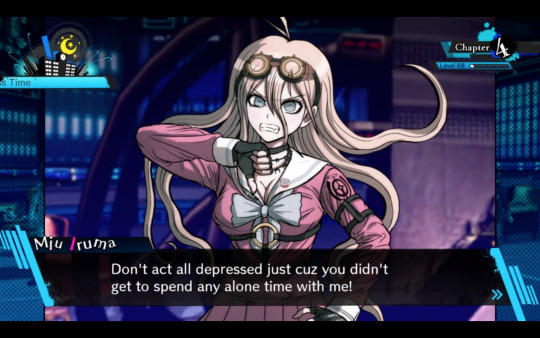
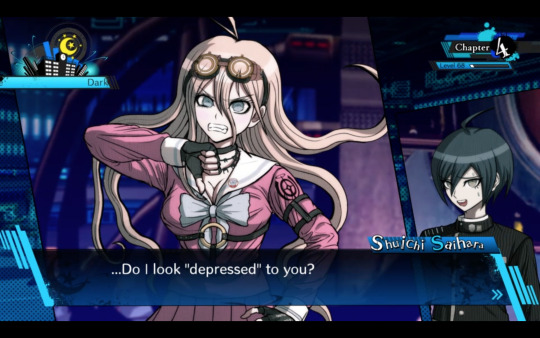
Mm yes sassy!Shuichi is good for the soul
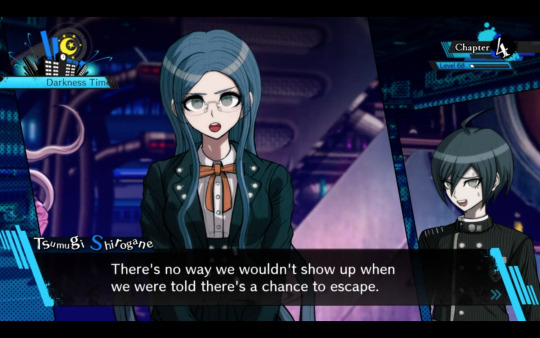
So Miu literally went to everyone to bring them together, huh? I, uh, honestly didn’t expect to have a big group meet-up the night before the ‘big day’.
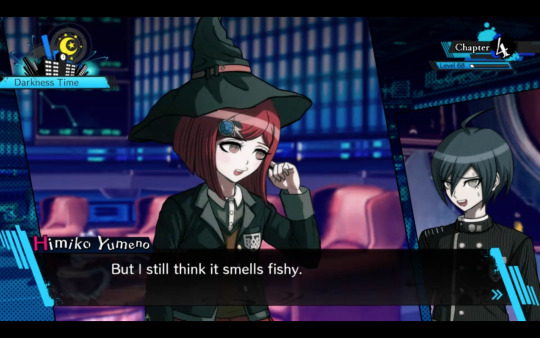

Oh hey, look who finally decided to show his face again! I’ve been wondering what you were up to!
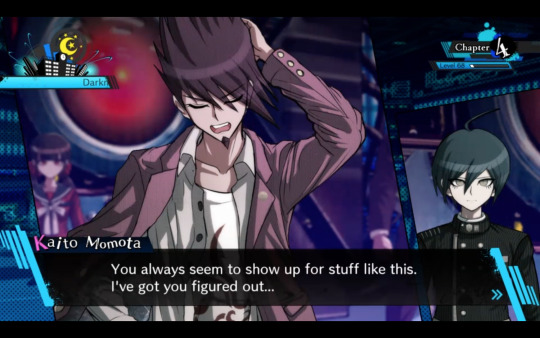
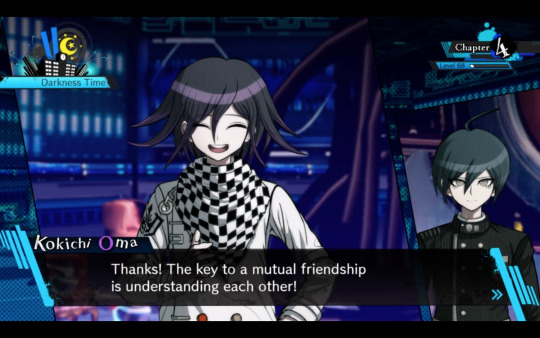
want to share with the class, Kaito
also please don’t tease me with a Kokichi & Kaito friendship and not deliver
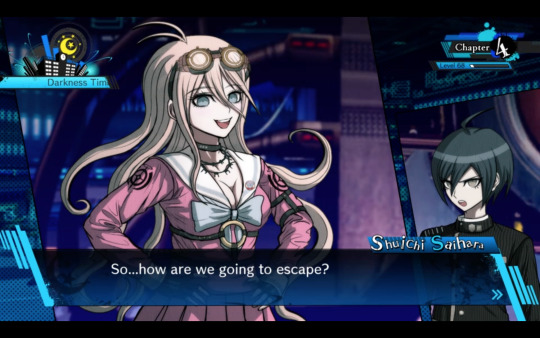
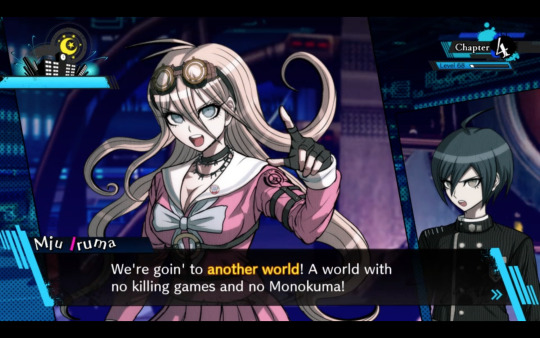
Miu is totally trumping up what she made I DON’T BELIEVE YOU THIS IS JUST ANOTHER EXAMPLE OF ESCAPISM
except instead of Atua we have gone in the opposite direction
with technology
BUT FINE PLAY COY SEE IF I CARE it’s not like the cast itself has the benefit of SDR2 behind them - though with that said tsumugi totally referenced the first case last chapter trial by accident. Honestly, it makes me wonder how far back the events of other games are? I mean, Monokuma is around, and they recognized him in the prologue, so is it possible that the events of the previous games have become part of historical lore or something?
Anyway, that’s stuff to think about another time. Kinda getting distracted...
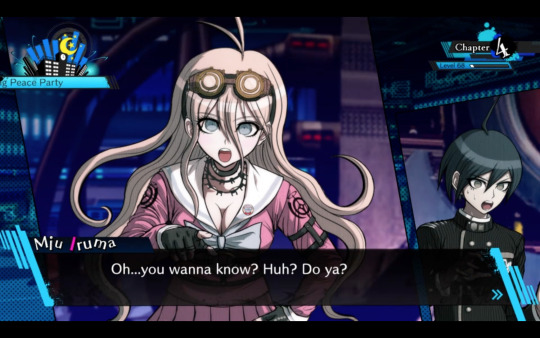
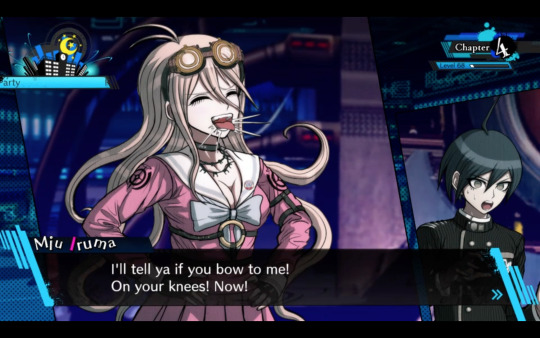
Someone is on a power trip.
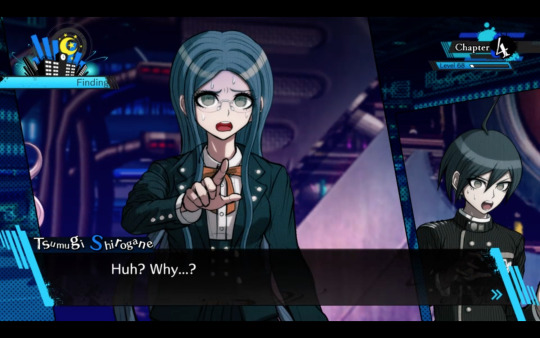
YEAH UH THAT’S A REALLY GOOD QUESTION ACTUALLY...
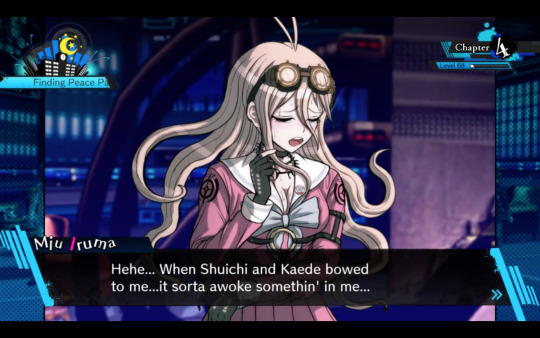
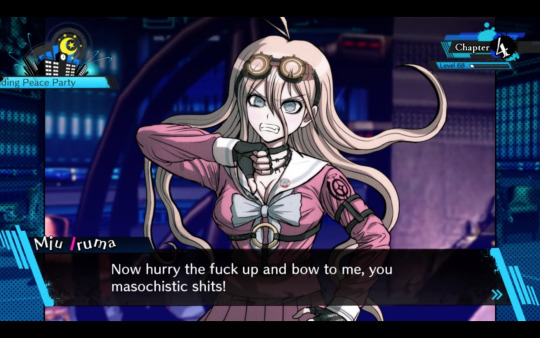
HEY EXCUSE YOU MIU you can’t call us masochistic if we’re not doing this consensually!!!
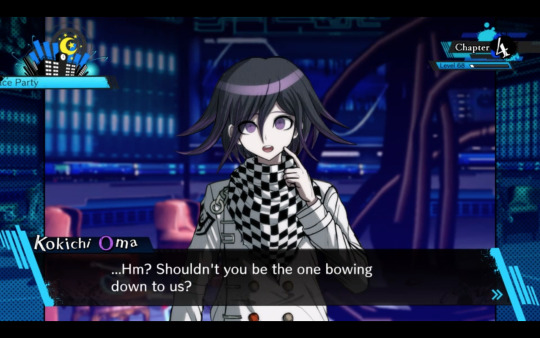
it’s time to flip the chessboard
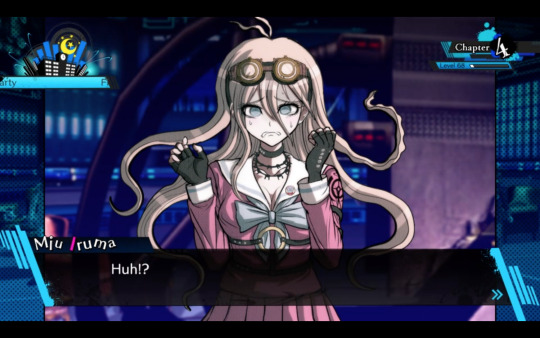
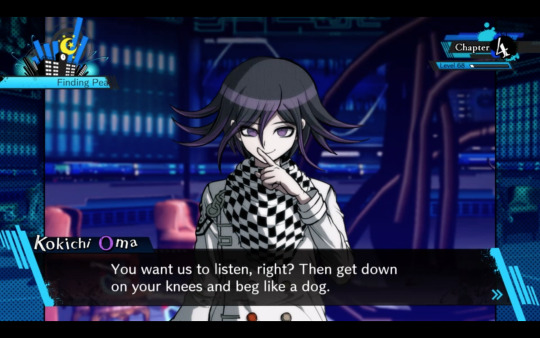
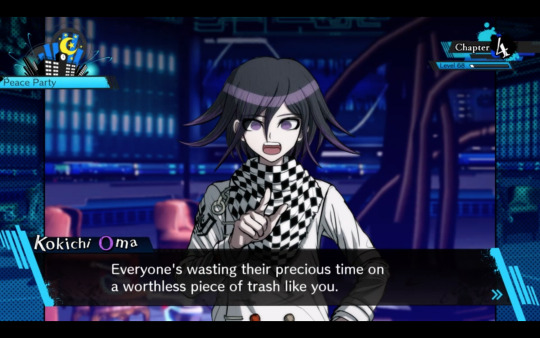
Oh, yikes, damn. This is that side of Kokichi that I haven’t liked. Not him acting like an evil supreme leader - he did a bit of that in the FTEs I’ve done so far - but there’s always something... I don’t know, a lot crueller and more vicious in how he talks to Miu? I mean, not that she’s the perfect person herself, but she doesn’t deserve this. And yeah yeah, I know there are probably arguments about the weird sado-masochistic thing they both seem to have going on but... no, I don’t think that’s ever going to sit well with me. Miu’s got some serious problems going on, and Kokichi’s not playing into them, he’s actively using them against her. And again, I don’t mind him doing antagonistic things, not at all! But everything, outside of this, has seemed so much cleverer.
Then again, after the display from the night before I guess I should start expecting outright cruel and scary things from him. 8′D
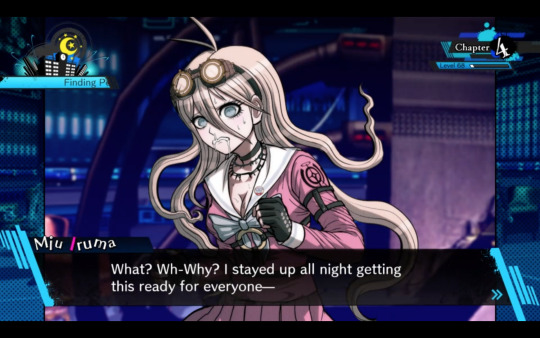
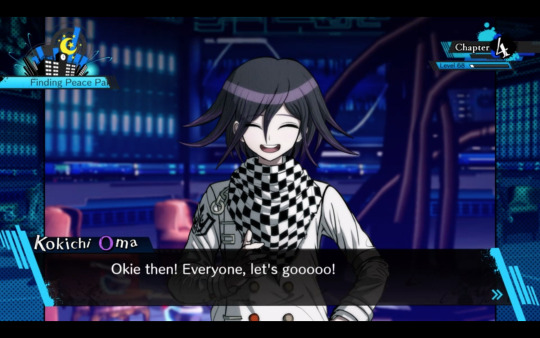
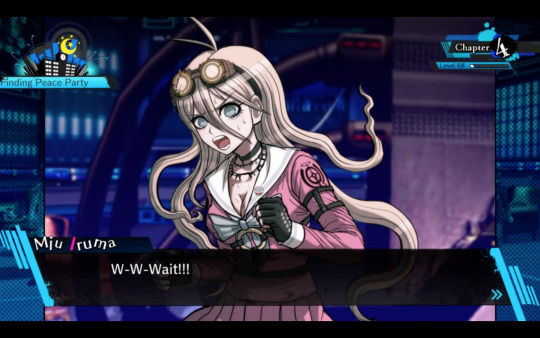
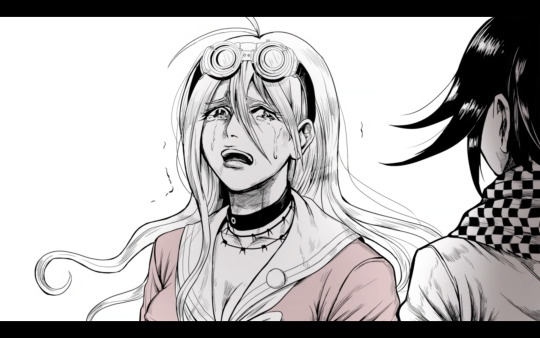
HOLY ART STYLE CHANGE WOW THIS IS REALLY GOOD
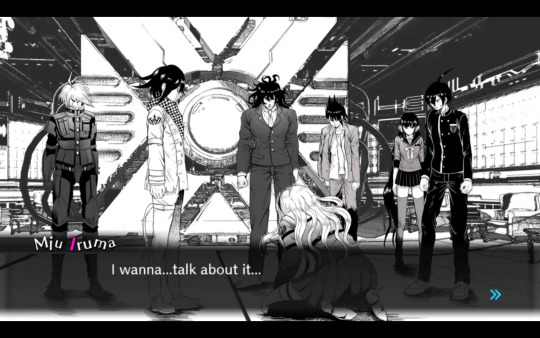
despite all the epic Clamp-esque ‘long leg’ syndrome going on I... really like how everyone looks in this...
Ah, I’m annoyed that I don’t recognize the style though. This is definitely a reference that most people would immediately get if they were on the other side of the ocean.
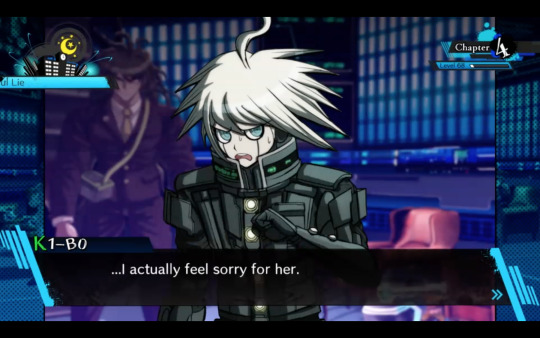
WOW K1-b0 that’s cold considering you may be the closest person to her!!! I think I’m starting to let my ship!feelings cloud my observations, yikes...
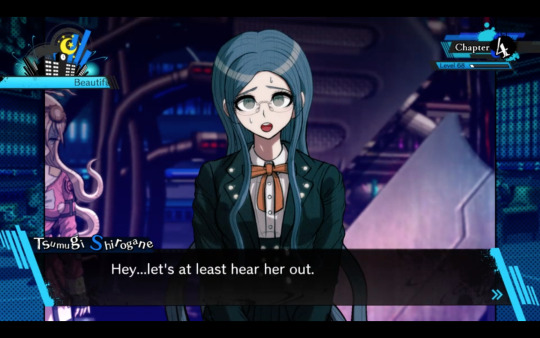
Aaaw, Tsumugi. 8′\ What would Gonta and the others do without your sporadic support, honestly.
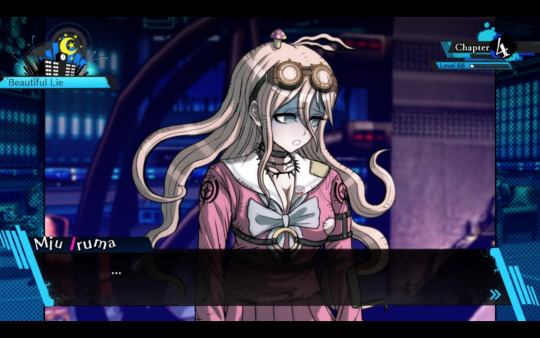
Aaaaw sad mushrooms :( is this a new sprite? also doesn’t junko have one like this too
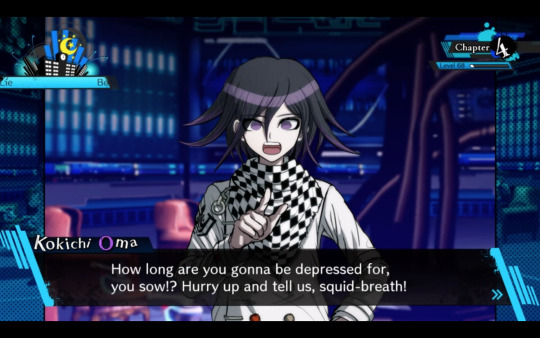
OKAY KOKICHI ENOUGH GEEZ
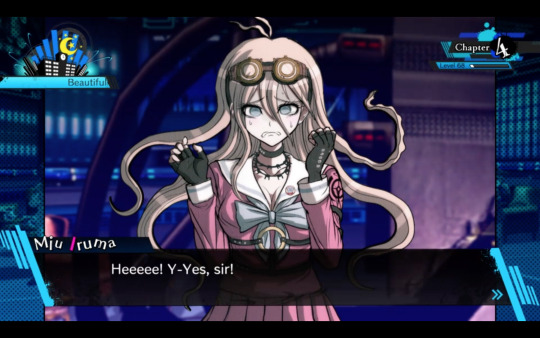
Man, something went terribly, terribly wrong in your past, huh.
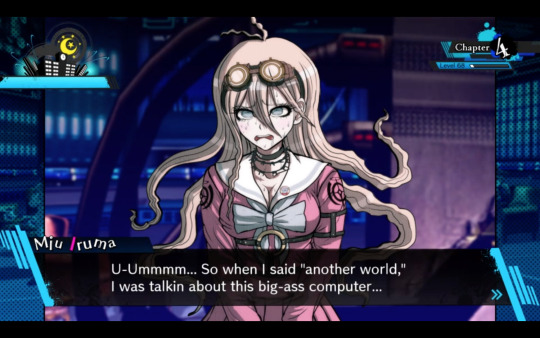
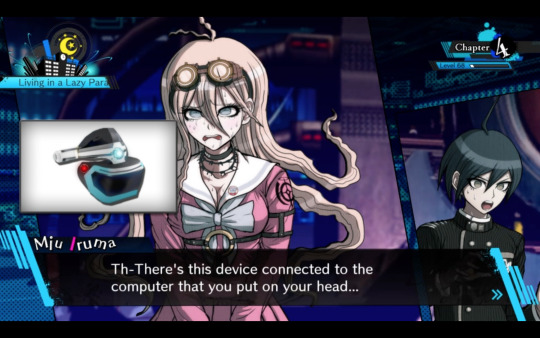
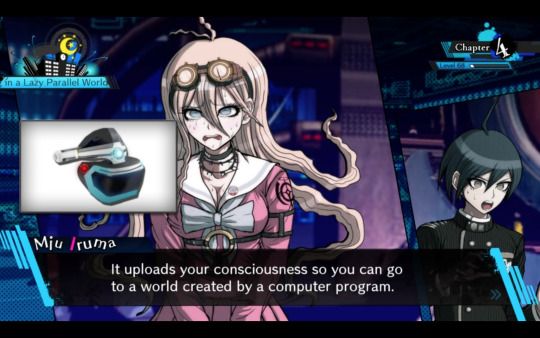
YUP I KNEW IT
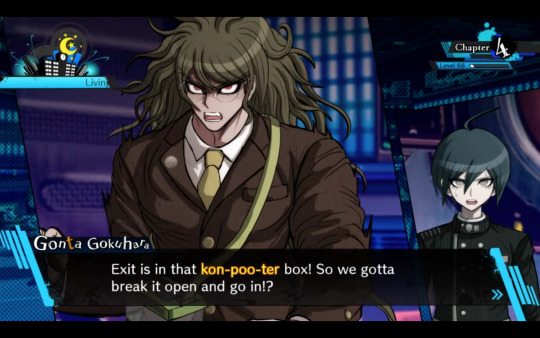
Zoolander references? In my Danganronpa?
THE FILES ARE INSIDE THE COMPUTER
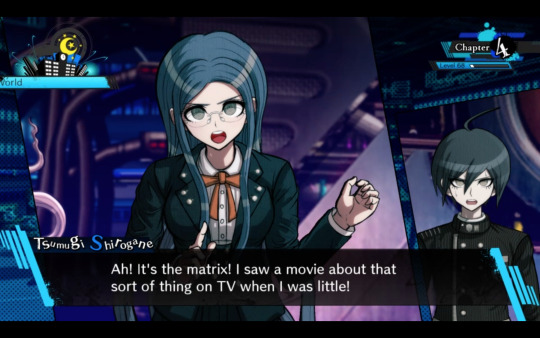
Tsumugi seriously how old are you?????
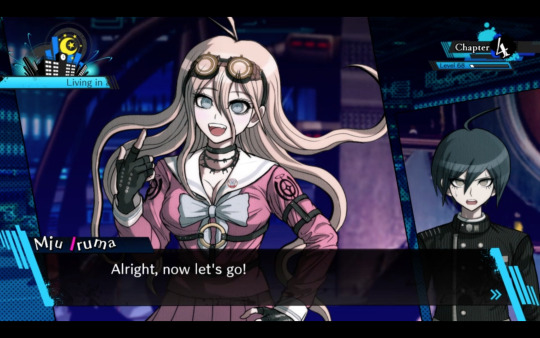
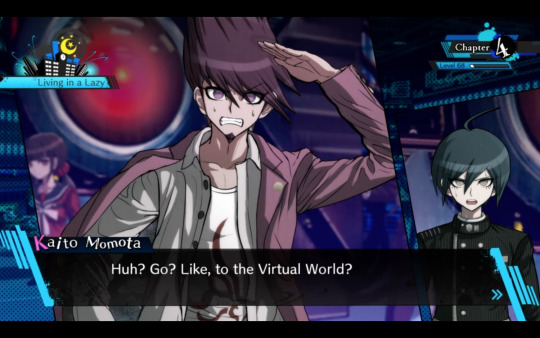
Wait we’re seriously doing this right now??? W.... We aren’t, are we? I thought this would end up like the others (watching everyone’s videos/Necronomicon) - big build-up, and then a last-minute detour! I even came up with the name ‘Motives, interrupted’ and everything...
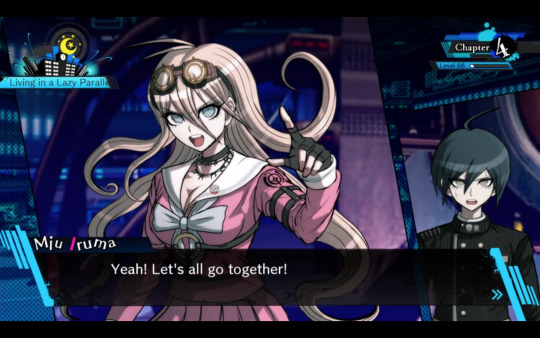
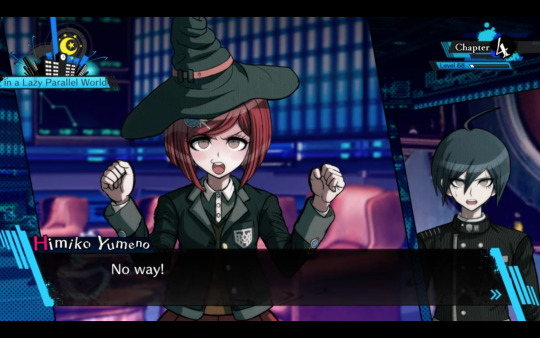
DAMN that was fast. But hey, more energetic Himiko!
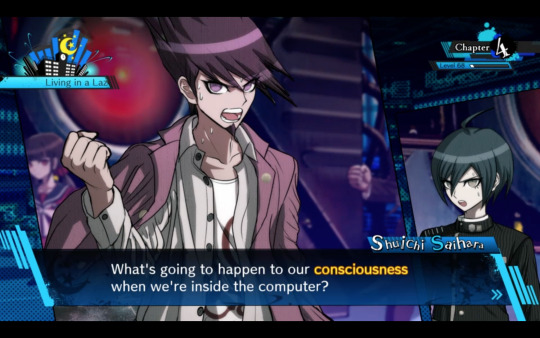
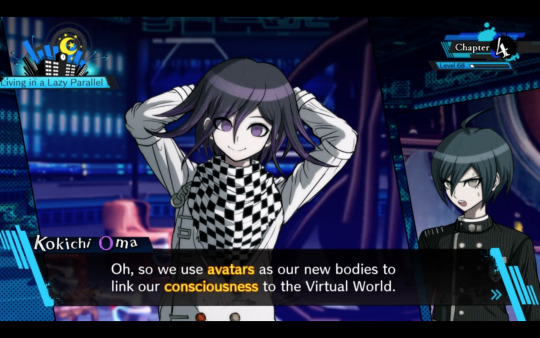
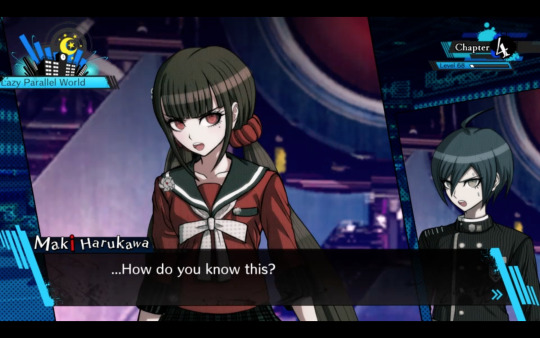
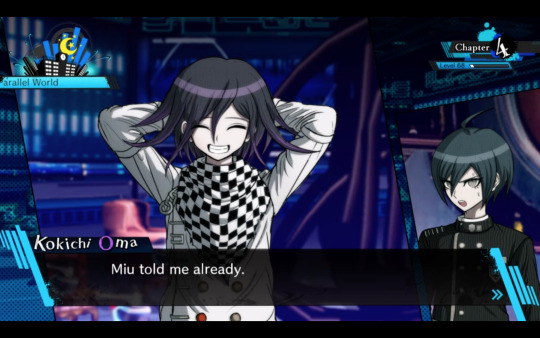
Uh.... what? She told Kokichi of all people? I... didn’t think they talked outside of trials/them insulting each other...
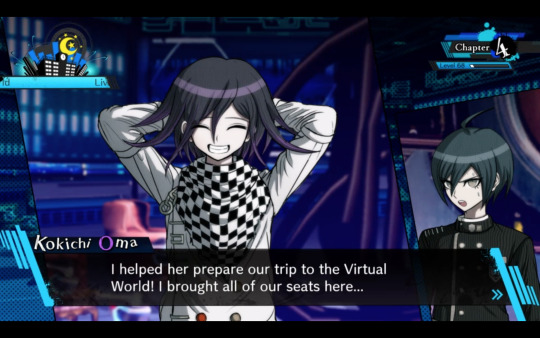
Aren’t you literally the one who was complaining about how heavy the Dog Statue was last chapter.............
Well, I mean, I guess having more intel was worth it to him, maybe? I’m guessing he had gotten wind of it before actually moving the chairs, because they weren’t there earlier and the Monokuma scene happened the night before - and he clearly knew some of what she was working on. So has he been spying on her then, or just talking more than I realized?

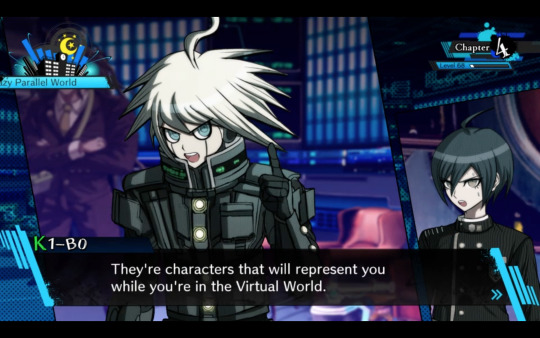
Poor Gonta, getting used as the audience surrogate. 8′D I guess I shouldn’t be surprised computers aren’t your strong suit, huh...
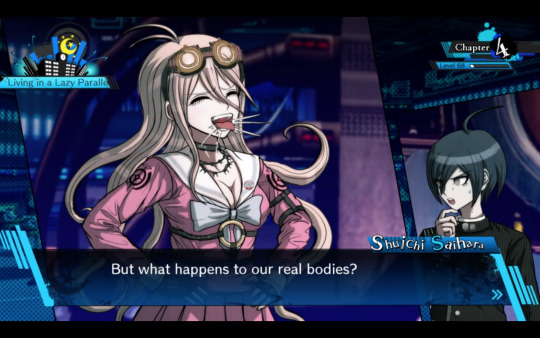
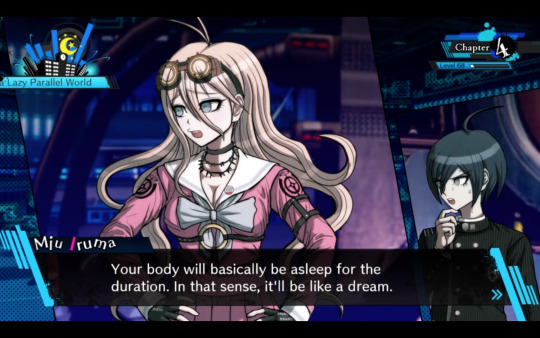
WHELP... THAT’S..... WORRYING......
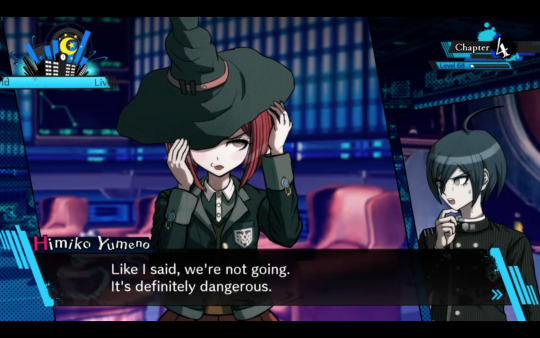
Yeah!!! I mean, they’re literally going to be all defenceless! All it takes is for someone to fake logging in and boom, another body!
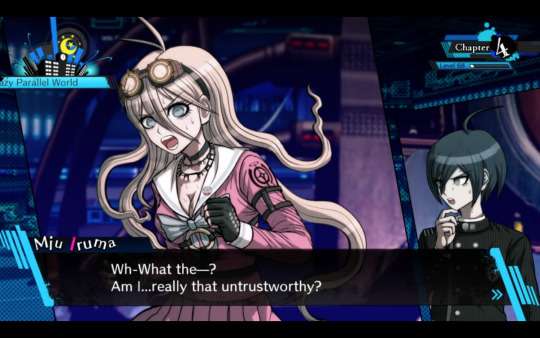
I DON’T KNOW MIU, ARE YOU? YOU WERE KINDA FREAKING ME OUT AFTER THAT FLASHBACK LIGHT BUT ALSO IN AN INCREDIBLY OBVIOUS WAY...
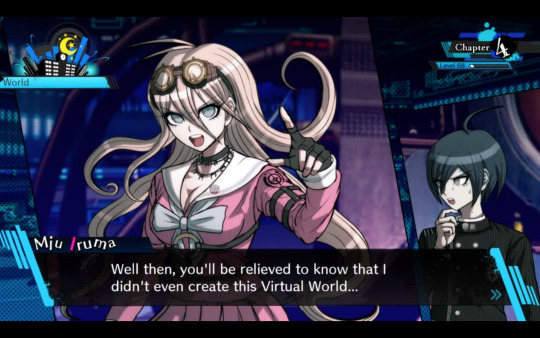
omg it totally is based on the NeoWorld program, isn’t it
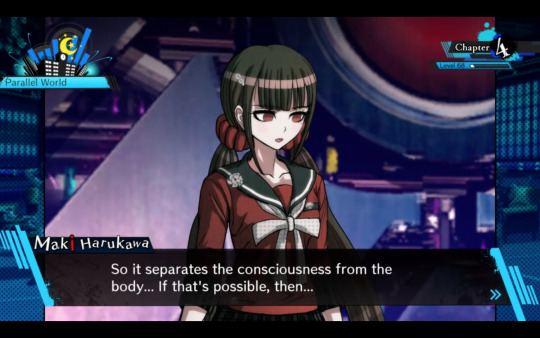
...???? What are you thinking about. Does it have to do with you specifically, or is it related to why you guys are all here. VR in VR??? Maybe???
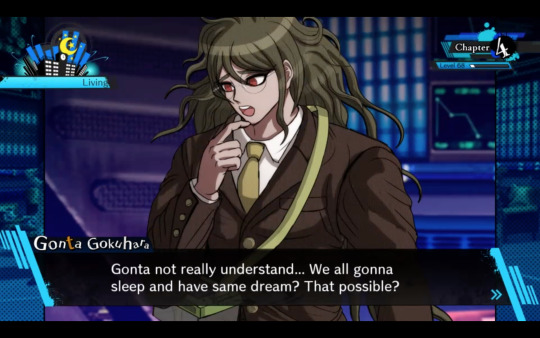
I know I should be against Gonta’s ‘wild man/fish out of water’ stereotype being played up but it’s a relief to see him not worrying about everyone/beating himself up for once this chapter, so... :(
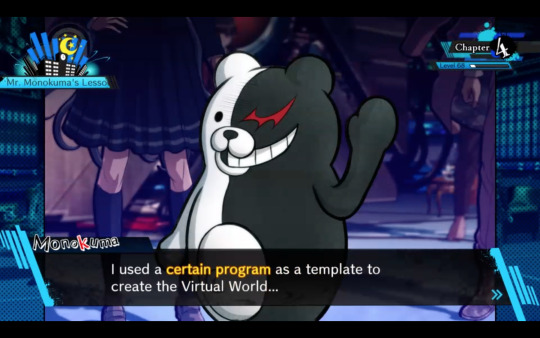
SAY THE NAME YOU COWARD
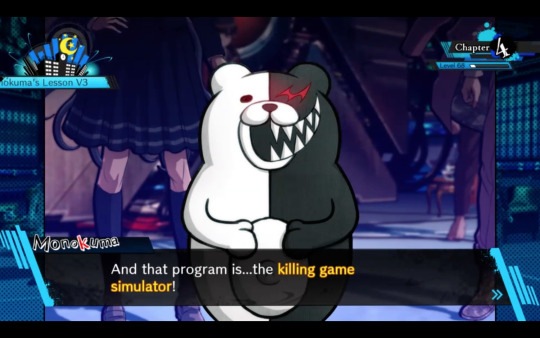
MIU IF MONOKUMA IS LETTING YOU FUCK AROUND WITH HIS PROGRAM WITH THE NAME ‘KILLING GAME SIMULATOR’ WHY WOULD YOU THINK THIS WAS A GOOD IDEA FOR EVEN A MINUTE
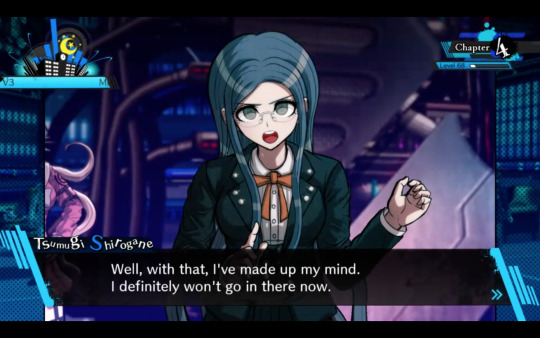
YEAH NO FUCKING KIDDING
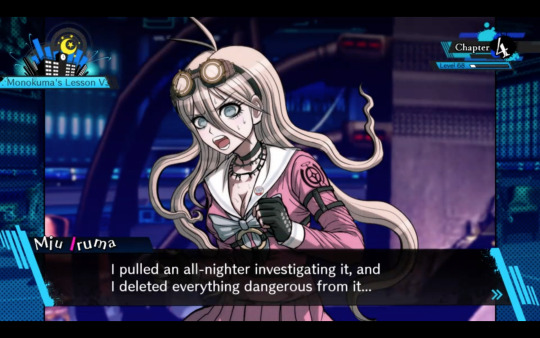
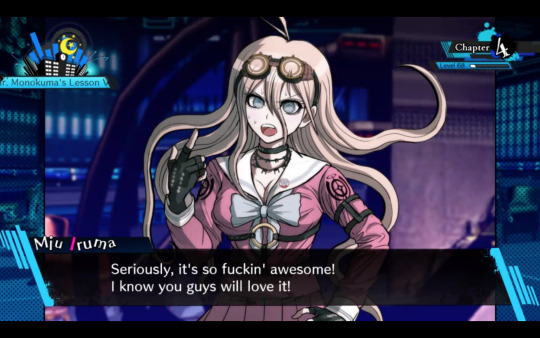
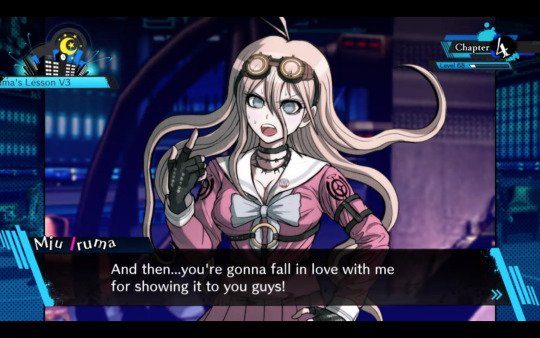
Man, I do feel bad for her in moments like this though. She really, really wants that validation from everyone, but just doesn’t seem to understand how to get it in a way that doesn’t piss everyone off and/or objectify herself, or -
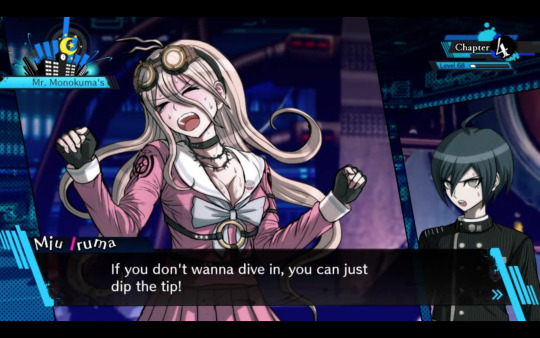
.......................................... yeah
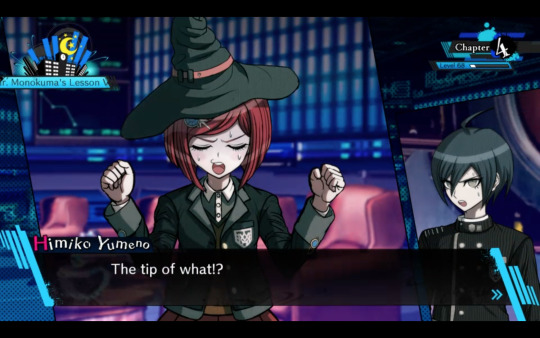
Don’t ask questions you don’t want the answer to 8/
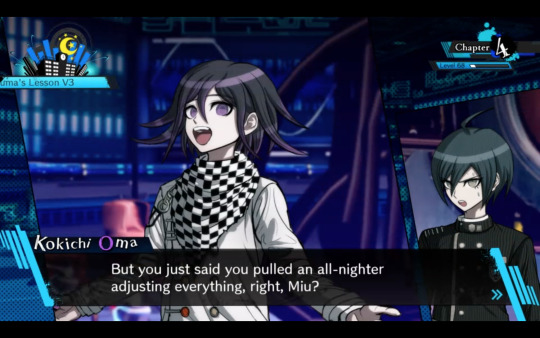
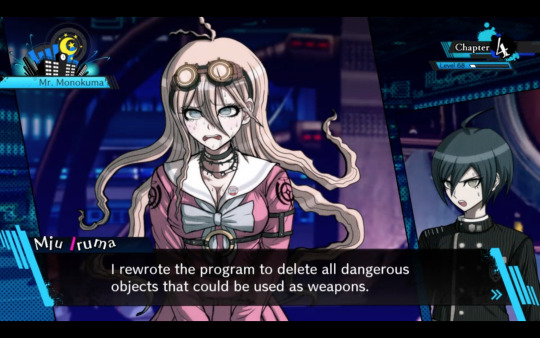
B-But what if people improvise and use a non-traditional method, or just do something that doesn’t require weapons? Or just kill them in the real world while they’re ‘asleep’? D: There are way too many ways for this to go wrong sdlkfj I mean it’s obviously just because we’re close to the deadline that I’m worried (and watch the game let things proceed without anything happening only for someone to wind up dead after their initial foray into the VR world) but still...
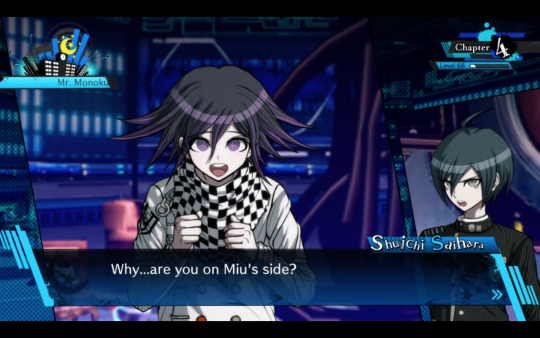
Shuichi’s getting bolder :D
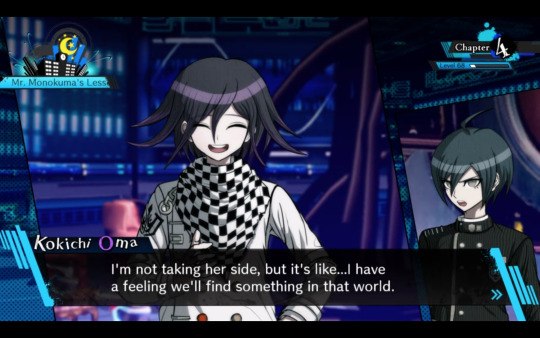
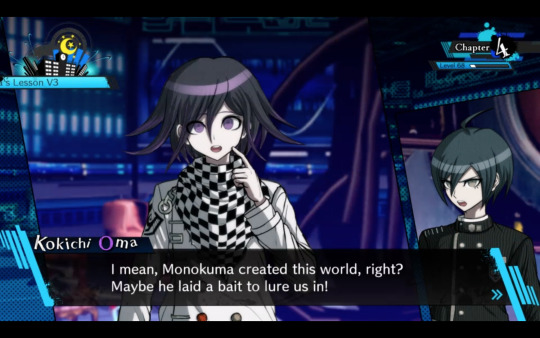
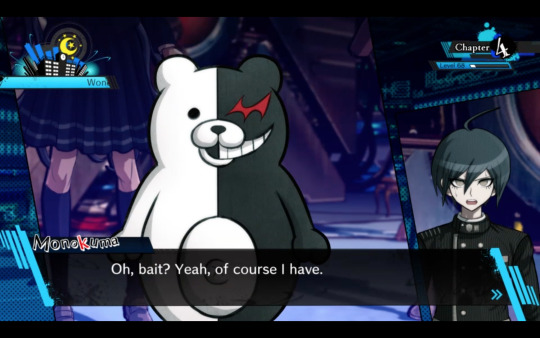
omfg Monokuma can you at least try to be subtle about working with Kokichi - he’s at least trying to.... a bit.... like, barely passably...
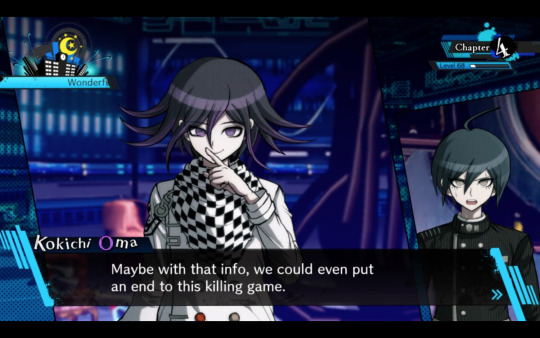
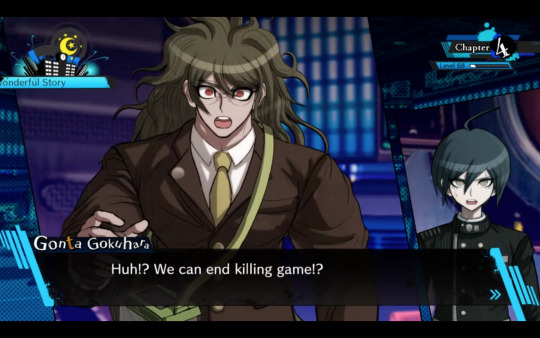
And that’s all it took to win him over 8/ Seriously, it’s kind of scary how easily Kokichi can manipulate him.
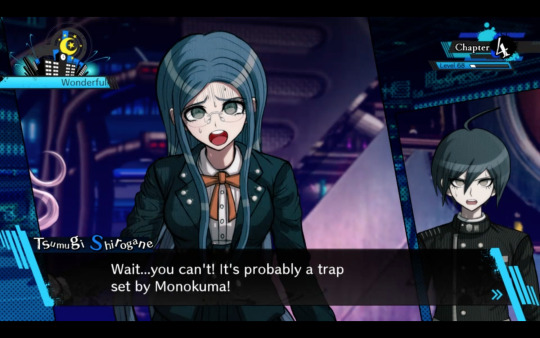
TSUMUGI IS ME, SCREAMING AT EVERYONE TO NOT GO INTO THE 99% OBVIOUS DEATH TRAP
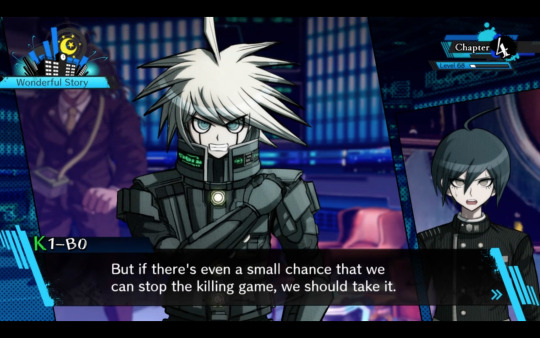

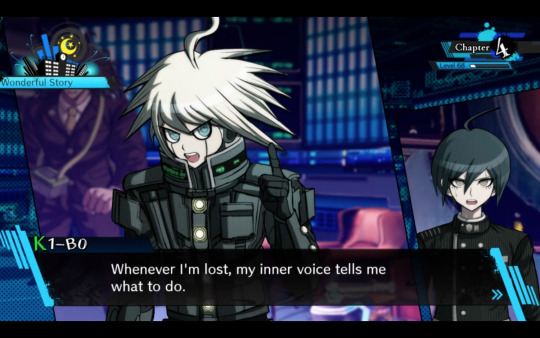
There’s that talk about the inner voice again... we’re definitely going to hear about that in the future. Programming? But based on what? That’s the real question. I’m still toying with that whole ‘Nanami’ role potential and his talk of hope last chapter...
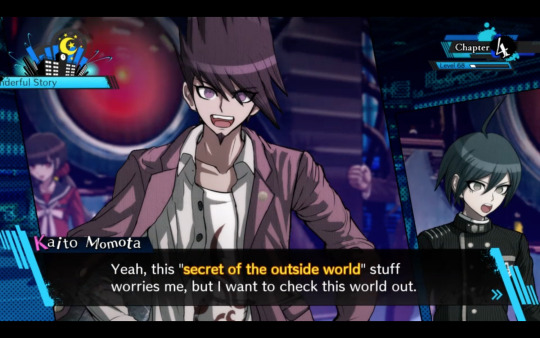
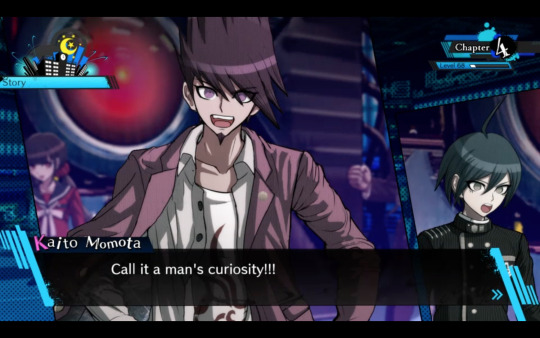
damn it Kaito stop following your man’s curiosity and start looking into a woman’s sober second thought
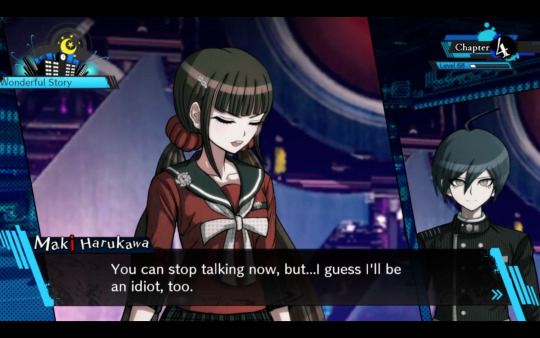
MAKI. THAT WAS SUPPOSED TO BE YOU. YOU ARE THE SOBER SECOND THOUGHT.
I know you’re on that slow path of falling for Kaito but why??? Why can’t you be the voice of reason??? Are you only going there to support him???
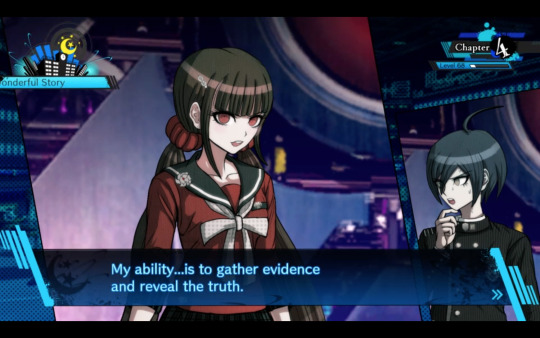
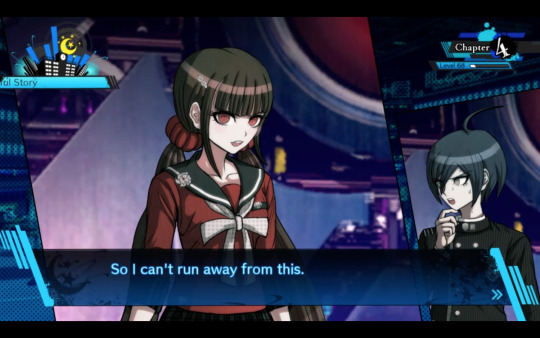
I mean, that’s a better reason than we got from Maki but walking into an obvious trap just to find out how it springs is still not the smartest choice, Sweetcheeks!!!

still me
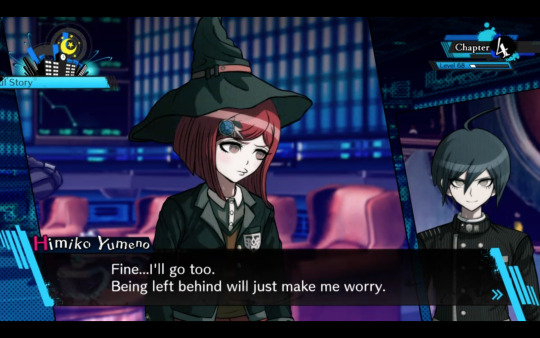
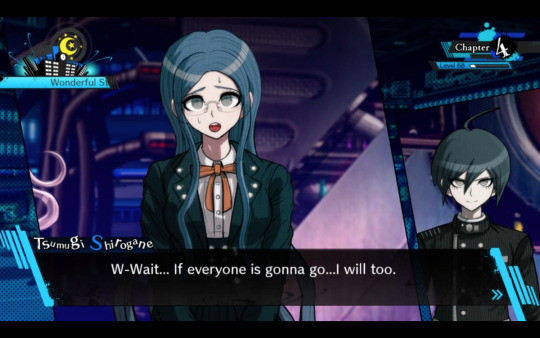
and also make you the prime suspect for whatever murder inevitably happens
Man, poor Tsumugi. I feel like she knows where this is going and just does not have the charisma outside of cosplay to keep it from happening. Better luck next time, girl 8′\
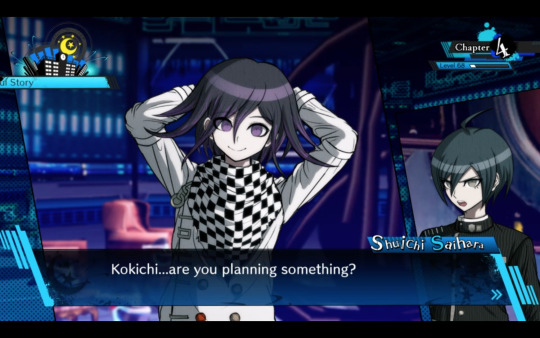
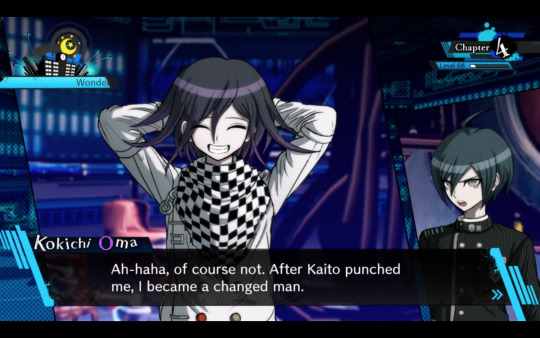
Ugh, the lies like this ^ are so obviously transparent and it makes Kokichi so much fun to have around and watch. I feel like he’s making a subtle dig at Kaito’s shounen!protagonist attitude - oh hey, and for that matter, it could be a reference to him punching Shuichi way back in chapter 2 and how Shuichi’s developed since then.

Can you imagine him saying that with the face he showed the night he was talking to Monokuma because the thought is cracking me up tbh.
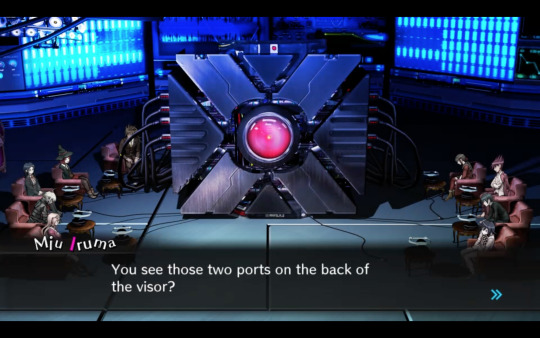
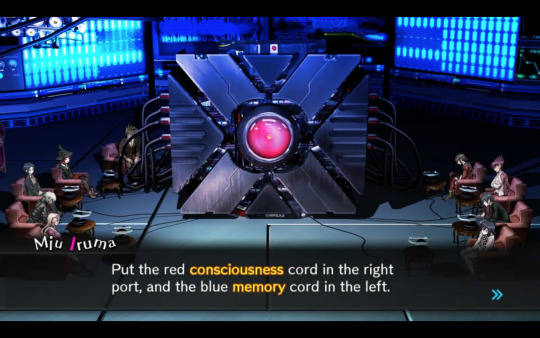
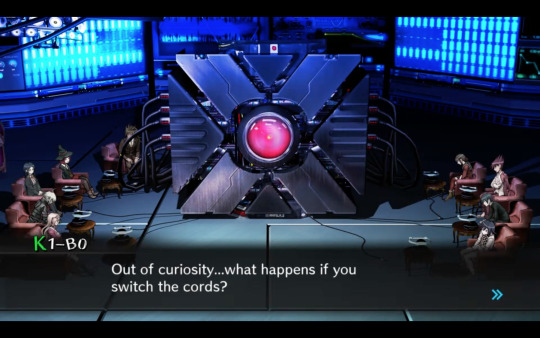
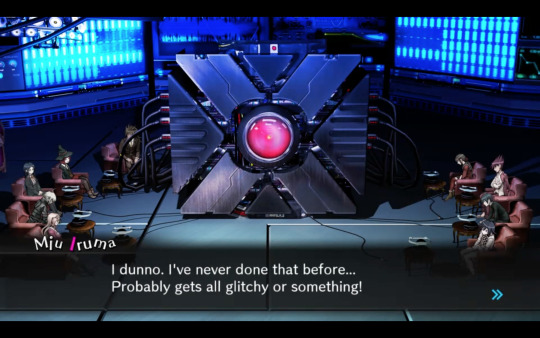
There is no way this isn’t going to come into play later. 8′\ I guess the question is how? Man, what if it screws with someone’s head ala Mikan...
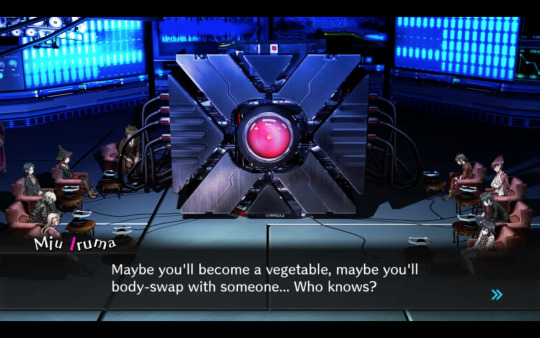
OH MAN ARE WE GOING TO GET A BODYSWAP THAT WOULD BE AMAZING
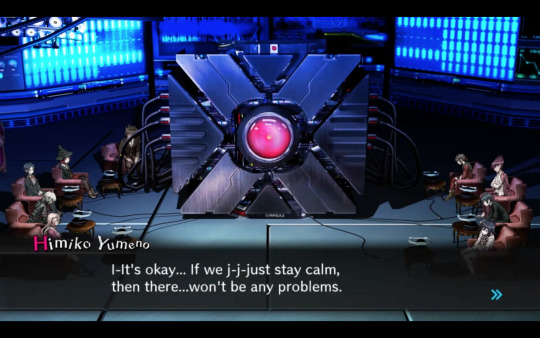
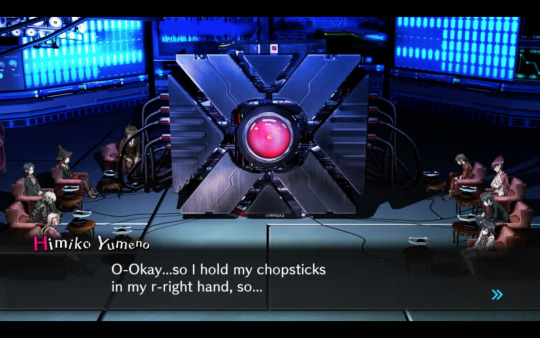
I really didn’t need keep this part but god do I find nervous!Himiko incredibly adorable... she’s trying so hard, guys. 8′/ She’s trying so hard to keep it together. And she’s doing it by herself, this time!
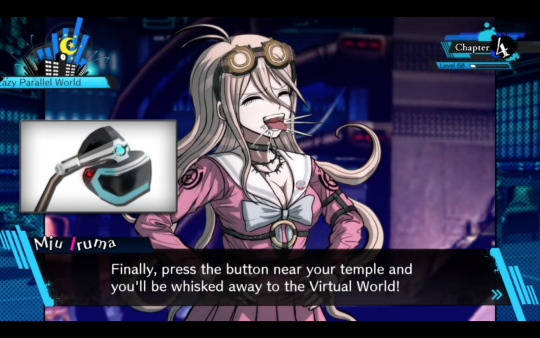
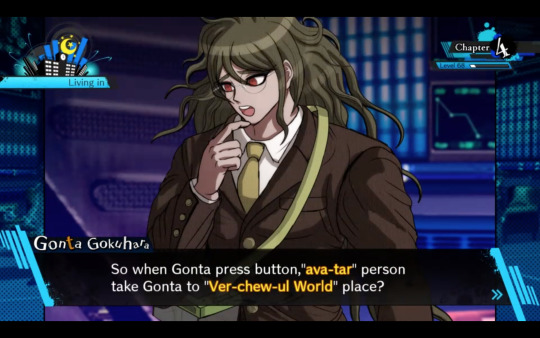
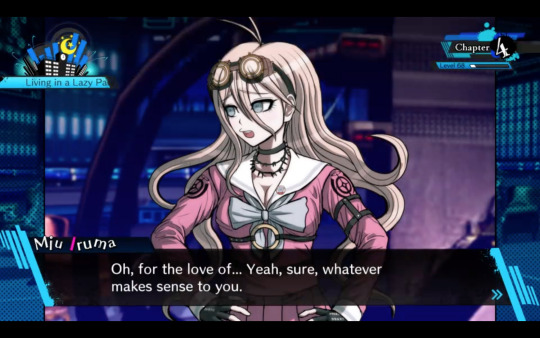
DAMN IT STOP BULLYING GONTA I’M LIKE, 99% SURE HE’S GOING TO DIE HE DOESN’T DESERVE ANY OF THIS
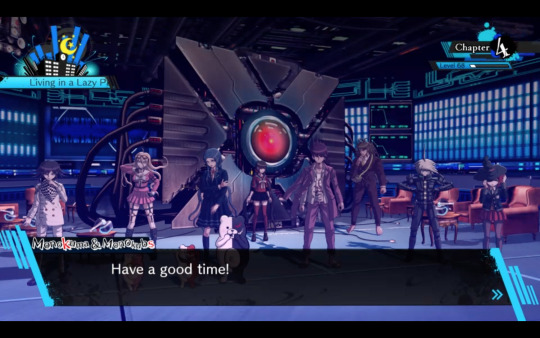
Whelp. Um. I didn’t think we were actually going to go through this. Man, are we going to end up back on the island then? Is Usami going to be there? Nanami? Komaeda???? omfg wouldn’t that be a disaster he and Kokichi together would be terrifying
......
TERUTERU AND MIU WOULD BE TERRIFYING yikES
#Ryou plays drv3#Kaito Momota#Miu Iruma#Himiko Yumeno#Shuichi Saihara#Keebo#K1-b0#Maki Harukawa#Gonta Gokuhara#Kokichi Ouma#Kokichi Oma#best thing about miu-centric stuff is that I get to make innuendo titles#spoilers#drv3 spoilers
40 notes
·
View notes
Text
Recommendations From the Coalition for Physician Accountability’s UME-to-GME Review Committee: Winners & Losers Edition
By BRYAN CARMODY
If you’re involved in medical education or residency selection, you know we’ve got problems.
And starting a couple of years ago, the corporations that govern much of those processes decided to start having meetings to consider solutions to those problems. One meeting begat another, bigger meeting, until last year, in the wake of the decision to report USMLE Step 1 scores as pass/fail, the Coalition for Physician Accountability convened a special committee to take on the undergraduate-to-graduate medical education transition. That committee – called the UME-to-GME Review Committee or UGRC – completed their work and released their final recommendations yesterday.
This isn’t the first time I’ve covered the UGRC’s work: back in April, I tallied up the winners and losers from their preliminary recommendations.
And if you haven’t read that post, you should. Many of my original criticisms still stand (e.g, on the lack of medical student representation, or the structural configuration that effectively gave corporate members veto power), but here I’m gonna try to turn over new ground as we break down the final recommendations, Winners & Losers style.
–

The Coalition for Physician Accountability consists of 13 corporations that dominate medical education, residency training, and physician practice.
LOSER: BREVITY.
The UGRC recommendations run 276 pages, with 5 appendices and 34 specific recommendations across 9 thematic areas. It’s a dense and often repetitive document, and the UGRC had the discourtesy to release it in the midst of a busy week when I didn’t anticipate having to plow through such a thing. But this is the public service I provide to you, dear readers.
–
WINNER: COMMITTEES AND FURTHER STUDY.
All told, the UGRC recommendations aren’t bad.
Some – like Recommendation #11 below – are toothless but hard to disagree with, and many of the recommendations that are more specific don’t go as far as I’d like.

Hard to disagree with anything in Recommendation #11… but also hard to believe that asserting any of it is going to change anything. (To me, the most interesting part of this recommendation was the typing style shown in the clipart.)
But most of the recommendations are good, and almost all are thoughtful and offer the promise of improvement… someday, at some indefinite point in the future (after futher study and additional consideration by more special committees, of course).
There are a few immediately actionable recommendations (such as the proposal for exclusively virtual interviews for the 2021-2022 season) which are unlikely to generate much controversy. And there are a handful of others that ought to inspire more debate.
–

Recommendation #18 calls for reporting the results of both the USMLE and COMLEX-USA on the same normalized scale.
WINNER: OSTEOPATHIC MEDICAL STUDENTS.
Currently, around three quarters of osteopathic medical students take both the USMLE and COMLEX-USA. In almost all states, either one is sufficient for licensure – but residency program directors strongly prefer the USMLE.
The de facto requirement for DO students to take two licensing exams is expensive and wasteful, and I’m on record as opposing it. If program directors could assess relative exam performance at a glance – through use of a single normalized score – many fewer DOs would feel compelled to take the USMLE.
(It’s worth pointing out, however, that the National Board of Osteopathic Medical Examiners (NBOME) doesn’t need the UGRC in order to make COMLEX-USA and USMLE scores more easily comparable: all they’d have to do is replace their ‘distinctive’ 200-800 score range with the 300 point scale more familiar to most program directors.)

Approximate percentile conversions for the COMLEX-USA Level 1 and Step 1 examinations.
–
LOSER: MDS AND IMGS.
The problem with treating COMLEX-USA and USMLE scores the same is that not everyone can take either exam. Although DO students are allowed to sit for the USMLE, MDs and international medical graduates (IMGs) are not eligible to register for COMLEX-USA.
Put another way, a DO student who is unhappy with his/her COMLEX-USA score might choose to take the USMLE to try to improve it – but an MD or IMG gets only one shot.
But that’s not the only bad news for MDs and IMGs.
Although there is wide individual variation, DO examinees overall score ~20 percentile points lower on the USMLE than they do on COMLEX-USA.
This mirrors pre-existing differences in standardized test performance between DO and MD medical students: the average MD student scores around the 81st percentile for MCAT performance, while the average osteopathic matriculant scores around the 58th.

For students matriculating to an MD school, the average MCAT is around 511; for osteopathic matriculants, it’s 504.
In other words, to achieve the normalized score that will appear on ERAS, DO students taking COMLEX-USA compete against a somewhat less-accomplished group of standardized test takers than MDs and IMGs taking the USMLE.
(This potential source of unfairness could, of course, be rectified by allowing MDs and IMGs the option of taking COMLEX-USA.)
–
WINNER: THE NATIONAL BOARD OF OSTEOPATHIC MEDICAL EXAMINERS.
Recently, the NBOME has faced increasing questions about whether maintaining a ‘separate but equal’ licensing exam for DOs does more harm than good. I’ve argued – in direct response to a letter from the CEO of the NBOME himself – that all physicians should just take the USMLE, and that the NBOME should limit their exams to assessing specifically osteopathic competencies. Obviously, this kind of thinking presents an existential threat to the NBOME.
But if Recommendation #18 succeeds in establishing the COMLEX-USA as being equivalent to the USMLE for residency selection, the NBOME’s existence is all but assured – and they’ll find themselves in the enviable business position of selling exams to the rapidly-growing captive audience of osteopathic medical students for years to come. (You may therefore be unsurprised to learn that the NBOME’s CEO was a member of the specific UGRC workgroup that advanced this recommendation.)
–

With apologies to Captain Jack Sparrow.
WINNER: THE SHERIFF OF SODIUM.
While perusing the references for Recommendation #18, I was a bit surprised to see a link to an old Sheriff of Sodium post mixed among the references to authoritative academic journals.
Let’s just say this citation reflected a very selective reading of my bibliography as it relates to the NBOME… but I appreciated the credit nonetheless.
–
LOSER: THE UNMATCHED.
The preliminary report from the UGRC included 42 recommendations; the final report, just 34. Among the specific recommendations left on the cutting room floor was the old #19, which called for studying the unmatched.

Recommendation #19 from the UGRC preliminary report called for a committee to study unmatched applicants.
Sure, the final report still notes the need to “explore the growing number of unmatched physicians in the context of a national physician shortage” in recommendation #2, but you can’t escape the feeling that unmatched doctors are de-emphasized in the final report. (Other preliminary recommendations that seem de-emphasized include the previously enthusiastic support for an early result acceptance program, which follows a letter from the NRMP noting that they would not pursue such a program this year.)
–
WINNER: STUDENT LOAN LENDERS.
For many students, transitioning to residency is a period of serious financial stress. The student loans that were disbursed in August are long gone… but the first paycheck of residency may not come till mid-July or even the first of August.
To address this important issue, the UGRC brings us Recommendation #33, which calls for funding these predictable expenses “through equitable low interest student loans.”
Which, I guess, is one way to do it.
Of course, another way would be for programs to subsidize this transition. You know, insofar as residents are revenue generators for the hospital well beyond the value that they are compensated. (n.b., if anyone tries to use selective accounting to argue otherwise, simply ask them why some keen-eyed hospital administrator hasn’t cut the residency program if it’s such a money loser.)
Nope, says the UGRC. “These costs should not be incurred by GME programs,” going as far as to make a specific enjoinder against even offering sign-on bonuses.
Why go there? If a program chose to help with moving expenses or give a small signing bonus – possibly because they realized that doing so was a more effective way of recruiting under-represented minority applicants than giving them a lanyard or can koozy with the hospital logo – why stop them?
(The only reason I can think of is that if some programs started doing this, others might feel compelled to do it, too. Better for everyone to link arms, hold the line, and make less affluent residents take on more loans.)
–

Every year, students interview at more programs and submit longer rank lists – even though overall match rates are unchanged.
WINNER: INTERVIEW CAPS.
Recommendation #24 calls for limiting the number of interviews that an individual applicant can accept.
When 12% of residency applicants consume half of all interview spots in specialties like internal medicine and general surgery, this is low hanging fruit.
(My only criticism is that the proposal for specialty-specific limitations on interviews is unnecessarily complicated in a world when many applicants apply to multiple specialties – and may also have the unintended consequence of encouraging some well-qualified-but-nervous applicants to double apply.)
–

When programs aren’t transparent about their filters, applicants pay the price.
WINNER: TRANSPARENCY.
Recommendation #6 calls for a verified database of programs that will include “aggregate characteristics of individuals who previously applied to, interviewed at, were ranked by, and matched for each GME program.”
If this is implemented – and I have doubts it can be practically accomplished while maintaining the confidentiality of residents in the program – it would be a big victory for applicants, who may spend thousands of dollars applying to programs who never even read their application.
–
WINNER: DOXIMITY RESIDENCY RANKINGS.
Transparency about what kinds of applicants match at each program doesn’t just help applicants – it will be a data gold mine for Doximity Residency Navigator or any other company that purports to produce an ordinal list of residency programs by their quality.
Whatever data get included in the UGMC’s “interactive database” will be scraped by bots and used to judge the quality of the program (as if all residency programs were engaged in a direct competition amongst each other for a single goal). Look for more foolish metric-chasing to follow as programs try to make their reported data look good lest the rankings find them unworthy.
–
WINNER: CHEAP INTERN LABOR.
In my original post, I pointed out the somewhat head-scratching preliminary recommendation calling upon the Centers for Medicare and Medicaid Services (CMS) to change the way that they fund residency positions (so that a resident could change specialties and repeat his or her internship without exhausting the CMS subsidy that the program receives). Gotta say, I was disappointed to see this recommendation persist in the final report (now at #3).
I get it: some residents realize only during their internship that they’ve made a horrible mistake with their career choice and need a mulligan.
But to the extent that this problem occurs, does it reflect a failure of GME funding – or a failure of the medical school to provide adequate exposure to that specialty before someone spends a year of 80-hour workweeks doing something that they don’t want to do?
What’s most perplexing is assertion that this move will “lead to improved resident well-being and positive effects on the physician workforce.” Buddy, lemme just stop you right there – no one’s well-being is going to be improved by doing an unnecessary internship. Seems more like a way to turn career uncertainty into extra cheap intern labor.
Instead of “Try this internship! If you don’t like it, you can choose another one next year!” we should instead push medical schools to prevent this problem by abbreviating the preclinical curriculum, pushing core clerkships earlier, and giving students more opportunity to explore careers before application season rolls around.
–
LOSER: CHECKED-OUT FOURTH YEARS.
We’ve all kinda come to an agreement that the fourth year of medical school doesn’t pack same kind of educational calories as the first three years. For better or worse, fourth year has become a mixture of application season and rest/recovery before residency. Though there are exceptions, most students don’t receive educational value commensurate with the tuition they pay.
But Recommendation #30 calls for “meaningful assessment” after the Medical School Performance Evaluation (MSPE) is submitted in September, so that a individualized learning plan can be submitted to the student’s residency program prior to the start of residency.
That’s fine, as far as it goes – but it was the description of what that assessment might be that really made the hair on the back of my neck stand on end:
This assessment might occur in the authentic workplace and based on direct observation or might be accomplished as an Objective Structured Clinical Skills Exam using simulation.
If this were a WWE pay per view event, the announcers would be shouting, “Wait!!! It can’t be!! That’s the NBME’s music!!!” as the new, rejuvenated Step 2 CS exam strides into the arena through a cloud of fog. Maybe I’m being paranoid… but I just can’t believe Step 2 CS is gone for good, despite carefully-worded assertions to the contrary.
–

Want to be convinced that we need application caps? Give me 45 minutes of your time.
WINNER: APPLICATION CAPS.
I mocked the preliminary recommendations for repeatedly and correctly noting that Application Fever is the root of much of what ails the UME-GME transition – but failing to acknowledge the most logical solution. But now, in response to feedback received during the period of public comment, I am pleased to report that the final recommendations now includes the words “application caps.”
I’m telling you, momentum is building for application caps. Go right ahead and hop on the bandwagon. Plenty of room on board.
–
WINNER: INNOVATION.
Recommendation #23 calls for more innovation, which is hardly controversial or noteworthy. But what’s interesting is that the committee actually recommends some parameters for success.
Appendix C notes that goals could include a 20% reduction in applications submitted per position (i.e., from 132 to 102, or back to 2010 levels), or that we should stabilize the fraction of applicants who match outside their top three ranks (a fraction that has been steadily rising each year). And innovation should be allowed so long as the Match has matching rates of +/- 2% from 2020 Match rates (when they were 94% for US seniors, 91% for DOs, and 61% for IMGs).
And maybe this is what I find most encouraging about the otherwise-tepid UGRC recommendations. It does feel like there is some momentum building for real, practical change. More and more people are recognizing the problems and starting to think, at least, about ways of doing things other than how they’ve always been done, and we’re starting to set some parameters for how those changes might occur. These recommendations won’t get us where we want to go – but they build upon and keep those conversations going, and have to be considered a step in the right direction.
(Hey, I’m a glass-half-full kind of guy.)
Dr. Carmody is a pediatric nephrologist and medical educator at Eastern Virginia Medical School. This article originally appeared on The Sheriff of Sodium here.
Recommendations From the Coalition for Physician Accountability’s UME-to-GME Review Committee: Winners & Losers Edition published first on https://wittooth.tumblr.com/
0 notes
Text
Wrestles with Books by Masha Savitz
Excerpt from magical realism memoir, Fish Eyes For Pearls
I am born into the tribe of Israelites, the Children of Israel, people of the book.
Israel, Yisrael means ‘wrestles with God.’
What does it mean to be dyslexic as one from the people of the book?
I’m one who wrestles with books.
I’m a stranger in a foreign land and although I seem to speak the same language, I don’t understand.
This foreign place is school.
I am a character in my own imagined sequel to Camus’ book that I am assigned to read in high school, but never do.
Why would someone who claims to be an existentialist bother writing a book in the first place?
School is the first box.
People banter around the phrase, ‘Think outside the box.’ I didn’t know there was a box. I don’t know of this common system.
Some of us are born in the box, some are herded in soon after, while others need maps and instruction for finding it and operating within its proximity.
Some of us need this instruction drawn in colourful pictures depicting icons and landmarks associated with related emotional resonance. Some need mathematical equations, precise data with circumference for com- fort. Some prefer nautical, elemental references, including the movement of stars, time of year for bird migration and weather patterns.
Still others need it sung in a lullaby.
How does one enter The Box, and what might the consequences or rewards be for doing so? Can you get back out once you get in, are there emergency exits, public transportation, equal access for all?
Kindergarten is lovely, but all becomes alien thereafter.
I’m not indifferent, just different.
In third grade, I wonder how everyone else knows what to do, when I am so lost. We build a huge Noah’s ark. I make the lions. This, I get.
My father asks about my homework assignments. I don’t know. Why don’t I know there are homework assignments? He is frustrated, loses his temper with me. I feel bad that my smart papa has a dud for a daughter. I burrow deep into myself.
In high school, I sit down to study for a final exam, pulling out the year’s notes, all utterly incomprehensible gibberish, turns me cold and sick inside.
Like the moment we find out that Jack Nicholson, in The Shining, has spent all his time writing a book comprised of just one sentence, ‘All work and no play makes Jack a dull boy’, repeated a bazillion times.
That sick feeling.
Frightening- because this looks like the writing of a mad person. I burrow deeper. Never tell anyone.
But as an art major, I get into university. My personal essay and portfolio are strong. In painting class, I come to sense my intelligence.
I feel like NASA, discovering intelligent life, my own.
It has its own way of organizing, perceiving, analysing, it doesn’t live in my mind, no, somewhere deeper.
I will cherish and slowly learn to trust it, defend it, cultivate it, as it cultivates me- moving from the non- verbal languages to the written, expanding into my mind and heart, eyes and hands and into empty space.
At eight years old, I am fascinated with the back cover of a children’s scrapbook that my grandparents buy me. It is decorated with astrological symbols and signs. The written word, now, begins to interest me.
I read my first books in my twenties.
Astrology books allow me to match my own perceptions and knowing with the written words before me, creating a symbiotic relationship between my thoughts and words in reverse, a process which will eventually begin at the written word and lead to comprehension.
For the first time, the written word, this collection of letters and symbols, has a relationship with something I know. A pathway is forged in my mind for associating words with cognitive ideas and thoughts. Though decoding is still arduous, with effort I crack the codes.
My mind doesn’t build files. So, like a computer, if there is no file or system to save it to, bye-bye.
I don’t make this connection until after an entire summer of trying to organize my apartment, I find at the end it is no more organized than the day I started.
I walk around with a photo album or box of chargers and extension cords, trying to figure out where it goes, can’t decide, and pick up another object. Weeks of this make Jack a dull boy.
To support myself through college I get a job teaching at a religious after-school program at a synagogue outside of Boston. But I am ambivalent about being a teacher, since I had loathed school. I feel like a traitor.
There are children and there are grownups. Us and them.
I cannot conceive how it can be that grownups don’t remember how it was to be a child. Do they really forget? How does this happen?
When I am still a child, I wish as hard as I can to imprint this on my soul and mind, instructing my future self never to forget being a child.
This may be in part the reason it is easy for me to connect with children.
I never forgot. And I don’t forget. And some things about teaching become evident:
1. I have the opportunity to make school for others what it never was for me.
2. Whatever I hope to achieve as an artist happens more readily, efficaciously in a classroom.
I can create a small community of joy and expansion, honouring the individual, while working and sharing together as a collective.
I spot all the kids who are drifting away. I see their manoeuvres to keep me off their trail, so that I won’t suspect they do not understand the lesson.
I know where they are, I know how they feel. I know how to bring them back.
We expect children to meet us where we are. That is impossible.
Like someone adrift on a raft in the ocean, it’s a search and rescue mission.
We must get into the cold water with a life jacket in hand, because they are scared. They would rather fail from not trying, than fail after trying, because that is too humiliating. They will do what they can to avoid any more bruising. Protecting their fragile ego.
Because I am them, I know how to find them and get them safely back to shore. I won’t let you drown I try to say to them in the silent language of my gaze. Ich und Du, I and thou.
In this space created between us, the atoms that will form pathways, bridges, avenues trails and rails. Seeds yielding life.
While working with children I will often sense the profound field that is created, and the words I and Thou, coined by Vienna born philosopher, Martin Buber.
My first awareness of Buber is in a Jewish Encyclopaedia, where in volume ‘B’, there is in an old photo of Buber from the early 60s. My young father’s face beams out from among all the parade celebrants at the side of the eighty-year-old philosopher!
Without having read his work, I sense that this is in part Buber’s thesis, his foundation. Success lies in the space between. The mutuality. Where, sharing that same space, rapport is experienced. Then, can come communication, where all is possible, a third entity of commonality. The new colour made between two primary colours. The fertile green ground of potentiality created between yellow and blue.
The students, like works of art, require similar skills from me. It will be a dance between my will and their potential- a process of discovery.
My cousin, a child psychologist, connects me with a job to shadow an eight-year-old boy in a private Cambridge elementary school.
W has moved out. This gig should be lucrative and maybe rewarding. I meet Jared, the boy, and his mother for a preliminary interview over coffee.
He is quite a frail little thing, sleepy heavy lids, freckled chipmunk cheeks. He smiles politely, wiggling in his chair with feet dangling a foot from the floor.
I am now part of the second-grade class. The children pet my burgundy velvet full bodysuit. Jared throws blocks across the class at some other children and then runs out of the building. The teacher wants Jared out altogether. His meagre demeanour becomes meaner and meaner as he morphs into a petite terror.
I am given my own little office in hopes that I will occupy him for the school day and keep everyone safe.
Initially, I am told that Jared gets frustrated because he has learning challenges. Squatting on the floor of my office, he sharpens a pencil, and with great fervour, stabs my booted foot repeatedly, a maniacal grin across his face.
‘How is Jared doing? Is he learning his math?’ Asks his quaffed and tailored mother, sitting in my office a few days later in all shades taupe. ‘Well, when we can get past his anger.’ I answer.
‘He’s not angry,’ she replies, placing her hands in her lap.
‘Actually,’ I respond, ‘he is REALLY angry. ‘She smiles and clearing her throat explains, ‘Oh no, he’s just acting angry.’
Jared, though abusive, seems to need me. I’m the only one he has here, the only one who acknowledges that he is angry. But after years of a marriage with anger hurled in my direction at light speed, on the subway platform fresh from work, I hold back tears.
I sceptically purchase a book on energy healing from a local bookstore.
I sit at my kitchen table and read. This all makes perfect sense to me. Traditional therapy only builds a road between the emotional to that of the mental. To contextualize feelings, very important, a start, but ultimately limited. I learn that there are aspects of the self that the self cannot access. This speaks to my floundering stuck state. It seems I should consult someone that has studied with the author. I successfully track down someone in the Boston area.
After reading the book I make an appointment with Perry, an energy healer, I explain my situation...Jared is so angry and W was so angry...and I can’t take anymore anger. They need me, but abuse the one closest.
‘That’s because you are angry.’ Perry explains. ‘I’m not angry.’ I shuffle uneasy in an easy chair. He smiles, ‘No, you’re angry.’
‘Jared is not separate from you,’ he explains, ‘but rather an extension of you, and you need to see him as such, and only then, will you both heal this.’
The next morning, I take Perry’s advice. Jared and I go to the gym, and at the count of three, I instruct, we will hurl ourselves into the mats that are hanging on the wall.
‘One two three.’ We leap into the thick foam rubber blue plastic. SMASH. A shock as our bodies hit the mats.
Release. Laughter. And again.
Jared’s moods improve, as do mine. As he lightens, his academics, handwriting, and focus improve along with a joy of learning. They have diagnosed him all wrong. It’s not his school performance that makes him upset, but rather his upset that makes it impossible for him to concentrate on school work.
We write, do math, and research his favourite subject - dogs. We read about Max, a beat poet puppy and Jared writes poetry. But his parents become very concerned the day he punches a pillow.
I had brought in a pillow for him to punch as a way to express and expel the excessive, unmet anger. And, because I am now no longer threatened by anger myself, there is no invisible cap or limit to what I can handle. He is free to fully rage, and I am comfortable letting him go as far as he needs.
His slight boy frame collapses to the ground in exhaustion. Then he crawls back up and swipes some more. And when he is done, he is done. It is done. There is peace.
The next morning, we compose a poem together about the pillow, which he has beaten and thrashed the day before.
The Nothing Pillow, by Jared N.
My pillow is the colour of a sunset, it is soft as cloud, sits nice and warm like sitting by a warm fire in the winter, I want to lay on my pillow, to look at it, and make sure its ok. I call it the nothing pillow because it doesn’t do anything, and when I lie on it, I think of nothing. The stuffing is like cotton candy, I want to eat it. When I hold my pillow,
I feel happy as can be, I feel happy like a warm bed. Good night.
His parents accuse me of riling him up.
By the end of a winter that had left Cambridge squinty bright when the sun reflected off the miles of chalky white snow, that fell that year, Jared has a new school.
A few weeks later Jared’s prominent lawyer father calls to apologize for accusations and to thank me for ‘keeping it together’ when everyone else was ‘going under.’ Jared’s Head of Child Psychology therapist lauds me for seeing what even he missed. He writes me a letter of recommendation for a Master’s in social work at an East Coast school, but West cost is beckoning.
At my new job, I am asked to tutor Eric, athletic, magnetic smile and sweet nature.
He slips through years of Hebrew classes without learning how to read. Now, I am hired to catch him up, prepare him to come in front of the community for his Bar Mitzvah, leading and chanting prayers and scripture in Hebrew.
I work with Eric and he makes great strides. When I move to LA, another teacher takes over for me. She calls me and wants to know the secret of my success.
‘How did you do it Masha? Did you find out his diagnosis?’
‘No,’ I explain, I have a distrust and disinterest in diagnoses. They are too often wrong.
‘Then how? You did really well with him. What did you do?’
‘I played football with him,’ I answer.
‘What? Football? What are you talking about?’ He is athletic, and I show up on the football field, looking inept where he is a star. I’m on his turf, willing to be incompetent, willing to look foolish. So, he is prepared to take a risk with me, in my classroom.
We are equals, willing to go beyond protected boundaries, defended borders, trusting that the other will gently guide us towards success with encouragement and aplomb.
I hadn’t really had a plan, just instincts. I hadn’t been trained, I was unorthodox, just showing up empty and trying to intuit with the children, something no one had done for me. My dyslexia creates empathy and understanding, but I have no direct or received method for guiding them through.
With Rabbinical aspirations and schooling, I sometimes tutor and officiate the Jewish coming of age ceremony for those thirteen years of age, a Bar and Bat Mitzvahs.
Many of the tweens I work with are outside of the synagogue school system for one reason or another - a parent not Jewish, kids with learning issues, or the child that surprises parents by wanting the ceremony when the family is not particularly religious.
Because many of the students have no Jewish background, my lessons encompass everything from reading and writing Hebrew, learning about holidays, customs and liturgy, while preparing for the ceremony that they will lead in English and Hebrew.
We often meet at coffee shops accompanied with warm sweet drinks and pastries.
Each child is a riddle with a pad lock keeping them from full success. I unscramble codes and unlock each child, one conversation, lesson, or exchange, at a time.
Ich und Du
Mitch and Devon are twin brothers. One is very sensitive, polite, deeply moral. The other is sweet natured and only interested in baseball. Neither one wants to be studying for a Bar Mitzvah. Both are only doing it for their parents.
Mitch is certain this is not for him, but reconciled. He finds religion superfluous since all humans, in his estimation, know innately how to behave and do the right thing.
Dyslexia teaches me that, because I don’t have answers like a glossary of terms I can retrieve on demand, I am empty, open with receptors up. I understand I need to approach each child on his and her own terms, comfortable with not knowing. And, through listening, with the desire and faith to prevail, there is only the Ich und Du. There, I will find the answers, in the space between us. All is revealed.
Writing the Bar Mitzvah speech offers great opportunity to crystalize and articulate beliefs and ideas. It is a way to forge the nascent adult identity, affirming the individual within the context of family and community.
The individual within society, a balance we have not been able to quite achieve. A society which prizes the self at the expense of the greater collective breeds sickness, but also, failing to value the individual weakens the strength of the collective. Middle path says Buddhism, middle path.
Mitch expands on the idea of empathy ‘You know the feelings of a stranger, for you were strangers in the land of Egypt.’
Devon recites, ‘I discovered that Judaism and baseball are similar in many ways. Baseball and Judaism both have rules which allow everyone to play together, a way to measure yourself, and a standard to strive for. Both try to push you to be your best, the rabbi is like a coach, they can guide you, try to help you improve, but it is really up to you.’
After the service, I overhear Mitch say to his younger cousin, ‘Are you going to have a Bat Mitzvah? You should, it’s a lot of work but it’s so worth it.’ He sees that I overhear him. I lower my eyes, smiling in my heart.
Everyone has given up on Alex having a Bar Mitzvah. He is now fourteen.
I am told his ‘condition’ prior to our first lesson. He is diagnosed with mild Asperger’s. He needs structure, I am instructed. Well, if that’s what he needs, that’s what we will do. So, although I am more fluid in my approach, I will adapt to him, I will meet him.
But, structure is not what he needs. During my introduction, I outline in detail a very regimented schedule, and at the end remark, ‘But, I like to be open to inspiration.’
He smiles saying, ‘Yeah, that works for me.’
I ask him to repeat this, making sure he heard and understood.
We never have a rigid schedule from that day onward. He thrives. What I learn about him is the opposite of what the specialists advise. His emotions are very strong, if not addressed at the onset he is moody and unfocused. He must identify his feelings, needs, options, solutions, choices. We have incredible success, and fun. He is philosophical, creative, sensitive and sincere. He craves to express himself, to be heard. As do we all.
Maddie is bright and sassy. Her father is a professor of neurology and she, with the mind of a scientist and the attitude of a Westside girl, thinks that God and Hebrew school is a waste of her time. For weeks I try to find a way to reach her, bring her into the conversation. I explain that her agnostic voice is relevant and welcome in our class, that she too is an equally valuable part of the class. This doesn’t seem to mean anything.
I am losing her. It is like struggling with a painting. I will not give up.
We are making a short film based on a line from Deuteronomy, ‘Love God with all your heart, all of your soul, all of your everything.’ I open a conversation with her saying, ‘This project might be challenging for you to work on since you don’t believe in God.’
‘Yup.’ Only half snarky.
‘Let’s see if we can figure this out, a way for this to work for you.’
We discuss theology, science, creation, belief. She is unsure. ‘So, it’s a mystery to you?’ I reframe. ‘Yeah.’
‘What if we replace the word God for ‘Mystery’, I suggest. Instead we will say, ‘I love The Mystery with all my heart all my soul and all my everything. Would that feel right for you? Would that work?’
Bingo! Game changer! Maddie, is able to find integrity and meaning in her studies from this point forward.
The Bat Mitzvah makes sense as she can place herself comfortably in the tradition. When it comes time for her Bat Mitzvah, she uses the term, ‘The Mystery’ in her speech to the community, she learns her material quickly and easily.
Establishing trust is paramount.
Carl Jung believes and trusts implicitly that his patients must and will arrive at the right decisions on their own.
Since this marks one’s journey towards adulthood, I point out that this is a good example of exercising adult wisdom.
There is a time I had abandoned Ich und Du, and the consequences are not good. When I seek advice from ‘the experts’, my life lessons overwhelmingly expose their deficits, imploring me to trust my own wisdom.
A teenage boy directs a comment to me during class, ‘I thought of you the other day- in my bed.’
I consult the school therapist. ‘You need to talk to him, tell him this makes you uncomfortable.’ She insists.
I ask to speak to him after class and it’s awkward. I’m uncomfortable. These are not my words, my real sentiments. He looks shamed, mortified. He thought he was being cute.
My discussion with him hadn’t come from an authentic place in me, or acknowledged our genuine connection.
Sometimes, I handle sexual inappropriateness with a bit more levity and mastery. Two boys in the back of the seventh-grade class attempt to shock me.
‘Masha, is penis a bad word?’
‘No, penis is my favourite word,’ I respond. Screams from the back row. They babble and yell, arms flailing in adolescent gainliness.
‘Are you serious? ‘No sillies, let’s get on with work.’
I never have a behaviour problem again with this class. Putty.
And then there are the teachers that are pivotal in my life.
Geraldine Jackson, five feet of feisty, with pixy short hair and reading glasses that slide down a slightly pug nose. Lean and sparky. Often scary. She is the math teacher. I am a computative disaster. She puts me in the lower group and ignores me. The next year, she teaches English.
There is no awareness of different learning styles at this time. I assume stupidity is the culprit. ‘She’s sweet, creative.’ Is the best a teacher can say of me.
I am even a creative speller!
Every week Mrs. Jackson gives us a creative writing assignment. One week, though mine is short, my story on re-gifting makes her laugh. She reads it to the class. I am now on her radar.
From this point forward, I rise and rise to the bar set before me, becoming one of the two highest graded students in the class for creative composition. Myself and my friend, Missy.
I am not much for competition, more the Aphrodite than the Athena or Artemis. I am thrilled for us both. She is driven, petit though complains she is fat, frets about failing tests when she will score a ninety-eight.
Chances are I will score a thirty out of a hundred and I am woefully chubby. Eleven years of age.
The thesaurus is now my trusty companion, my favourite game - the wonderment of words! I seek them out, hunting words like a scavenger, a canine on the trail, a pirate for loot ‘n booty. Then, savouring the delight of the hunt, I tack them to sentences like animal heads to plaque and wall.
My treasury of gemmed jewels to which I will devote myself first comes in the form of the sixth grade Friday creative compositions where, I pull all-nighters, writing and rewriting.
Here, it starts. Deep into the hushed amorphous night, I am most awake, discovering shapes in the shapeless, word-less, time space, planting and harvesting in the rich fertile darkness. I am free.
Construction of the bridge begins.
I am born into the tribe of Israelites, the Children of
Israel, people of the book. Israel, Yisrael means ‘wrestles with God.’
What does it mean to be dyslexic as one from the people of the book?
I’m one who wrestles with books.
0 notes
Text
Establishing a Balanced College Life
A very intelligent man went by the name of Abraham Maslow. Maslow identified the five-tier hierarchy of needs that stated, in theory, that every human being has five different categories of needs that should be met to for an individual to feel fulfilled in life. This theory has been explained by using a triangle diagram and creating horizontal categories within the triangle to represent how each predeceasing tier has an impact on the following tier of needs, as seen in the picture below.
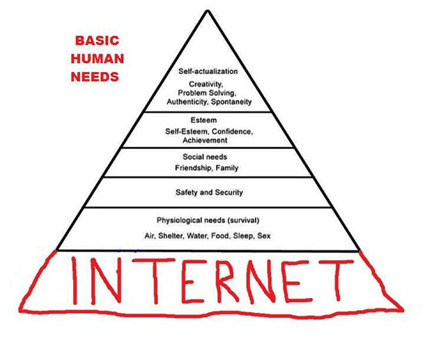
The special thing about the college hierarchy of needs is it encompasses internet as a necessity as well. Now obviously you do not actually need the internet to survive or feel fulfilled, but you certainly do in 21st century-college-land. All jokes aside, this hierarchy is essential in life and understanding your body’s needs is a very important aspect in college survival. The hierarchy flows in the following order: physiological needs, safety and security, social needs, esteem, and lastly, self-actualization. The rather comedic version of Maslow’s Hierarchy of needs, seen above, does a fairly effective job explaining which components go into the College Six-Tier Hierarchy of Needs. The important aspect is understanding that you possess all of these needs, and balancing them in college may be harder than ever before. Do not fear, though! There are so many healthy ways to help maintain a health, balanced lifestyle.
Let’s skip the internet tier, because obviously we can get the point there. The physiological tier relates to a human’s main necessities. This is difficult in college because your eating, drinking, sleeping, and possibly sexual needs will alter during this time. The cafeteria food is destined to be filled with fattening products because your campus is feeding massive amount of starving, poor, growing students. You can only enjoy salads for so many days in a row before you decide to jump in the hot-food line. Your tiny little microwave in your room can only do so much, and believe it or not, Ramen Noodles carry no nutritional value. For an 18-year old woman, this is a lot of change to occur in ones’ body in a rather short amount of time. In fact, a lot of concepts within Maslow’s Hierarchy of Needs relate to the “Health Triangle,” which addresses mental, social and physical health. However, we’ll save that for later discussion in this week’s Survival Blog. The important aspect here is to anticipate these possible changes in your physiological needs. If you plan for this kind of change, you can allow yourself ample time to prevent unwanted change. For example, if your eating and drinking habits do indeed change, you can arrange a schedule to fit in more exercise. Most campuses will provide an on-site gym, utilize this! Your needs can be satisfied in so many ways when you engage in physical activity. Refer to last week’s blog on “Getting Involved” to find out how you can exercise and have fun while doing so!
The second tier to understand is “Safety and Security.” Now, for a great deal of us, we chose to move across state lines, or at least head a few hours in the opposite direction of home. If this is the case, you will likely not have the same safe and secure feelings you carried in your hometown. It was comfortable there, and you knew your city like the back of your hand. Understand that you somehow have to make yourself comfortable in your new area. Explore as much as possible during the daytime because this eliminates some confusion if you’re ever outside during the nighttime. You know that fancy looking pepper spray bottle your overly protective relative gave you when you graduated? USE IT. Hook that bad boy to your lanyard, because ladies, we need to eliminate risks in life. This is absolutely NOT meant to advise you to pepper spray just anyone. But creating a safe zone for yourself can help satisfy your need to feel safe and secure! To simply put things, always be aware of your surroundings and take care of yourself. A support system of friends also helps here. If being a brownie taught us ladies one thing, it is to always trust the buddy system.

If you keep up with any College Survival Kit blogs, you understand I fully support Social needs. This is the next tier of needs in Maslow’s Hierarchy of Needs and I cannot begin to express how vital your social skills are during this time. The relationships you will build with your college peers are likely to be lifelong relationships. Seriously, there are countless studies that show that relationships built during this time are much more likely to last longer. Human interaction is huge, and we crave it when it hasn’t been met because we are so very preoccupied with responsibilities. In cases like this, take the extra ten minutes after class to talk to someone about anything. Have brief discussions with professors and peers if need be, but you need to maintain a fair amount of social interaction. Not only will this help you feel fulfilled with your social needs, it will allow you proper room to build relationships. Having these conversations with teachers’ assistants, professors, counselors, etc. allows you to build beneficial networking skills. You will be surprised with how beneficial it can be to become pals with your professors, because their connections are endless. Also, you never know when you’ll need a letter of recommendation, so fake it until you make it if you must!

Ladies, ladies, ladies. I cannot express the importance of this next tier enough. Your esteem is HUGE during your college years. This applies to your self-esteem, your sense of achievement, your confidence and so much more. Understand that there will be times in your college career where you will feel like you do not have it your life completely together. You might take a mental health day, fail an exam, miss a few workouts, the list continues. Please understand that you are still a hard-worker, who cares about their future and beauty shines far more from within. BE CONFIDENT. Understand that your worth is defined by who you are as a person and you are the only one who can truly define your character. The amount of progress and mental growth you will encounter during your college years in tremendous, so trust the process. Understand that you may not be where you want to be, but you’re working on where you want to go. Having this mentality will progressively increase the way you view yourself as a contributing, well-rounded member of society. You have worked so hard to even reach the point of attending a higher level of education, feel confident with that and continue working towards your goals. A healthy self-esteem will carry us young women very far in life.
The final tier in Maslow’s Hierarchy of Needs applies to self-actualization, which entails your needs to be creative, problem solve, be authentic, and spontaneous. These needs are those that keep us in touch with the side of ourselves that not everyone sees at face value. When you come into college, you have likely already established the spontaneous, creative and authentic version of yourself. Whether you enjoy being crafty, reading a certain genre, taking spontaneous trips, etc., these needs often are a stress outlet. It is so very important to not lose sight of these needs when you move to college. If you come into college as a crafty person, try making time to still get involved with those crafts. I had a roommate who had a very strong urge to enroll in Art School prior to the college. Instead of pursuing this degree, she decided to enroll in the Business Program at a different university. Secure and content with her choice of business, she still designs canvases for home décor now. This is a prime example of how to meet your self-actualization needs while also maintaining a healthy well-rounded life style. As much as you are pursuing a higher education, take the appropriate amount of time to meet this tier’s needs because they contribute greatly to who you are as a person.
As promised earlier, I would discuss how Maslow’s Hierarchy of Needs relates to the Health Triangle. This can be seen in several of the examples I provided that give you ladies some insight on what to expect in these upcoming years, but let’s go ahead and chat a little more.
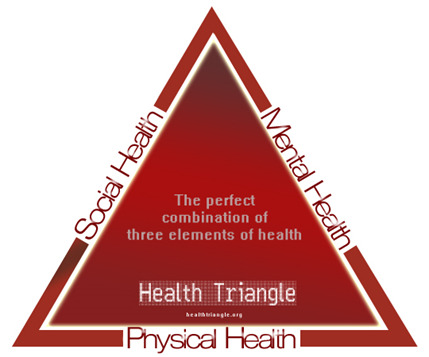
Firstly, this triangle is primarily where the healthily balanced lifestyle comes from. At the root of each of these health elements is your ability to be able to meet and balance your needs in life. Obviously, your social health directly relates to your social needs. It also contributes to the safety and security tier of needs, though. Creating meaningful relationships with those around you provides you with more room to feel safe, secure and comfortable at your home away from home. Your physical health can also directly relate to several of your needs. Number one, physical activity releases endorphins, which offers the human body several benefits. The release of endorphins triggers positive feelings in the body and can be very useful for stress regulation! This can help fulfill your self-actualization and esteem needs. Your mental health may also see benefits from a satisfied physical health. Those endorphins we were discussing are great here. Statistically, women are more likely to suffer from mental health disorders like depression and anxiety. Thankfully more commonly discussed in our generation, there are many natural steps you can take to minimize some of these mental health symptoms. Physical activity has shown great signs of correlation when linked to mental health disorders. If you do currently suffer from some of these issues, understand that you are not alone. Maintaining a health mental state is vital during this time in your life, as women are most susceptible to mental health disorders from 18-22 years old. This is not meant to instill fear into growing minds, rather to highlight that this is a common issue at this age and if you do not struggle with these symptoms, be understanding and compassionate with your peers that do. If you do encounter some symptoms, try finding positive outlets for anxiety and depression. If it worsens, believe that you are not alone and your campus will likely provide facilities to help channel negative energy elsewhere. In conclusion, finding ways to properly balance your life can feel time consuming when you get too busy in college. Do not ever lose sight of who you are and always keep your personal needs in sight. It is so easy to get consumed in college life chaos, but make sure you take time for yourself! Stay happy and stay tuned for more College Survival Kit tips next week. Peace and love, ladies. #MKT400UWL #CollegeGuide #CollegeSurvival #Freshman #CollegeGirls #LadyCollegeGuide #BalacingLife #LifeBalance
2 notes
·
View notes